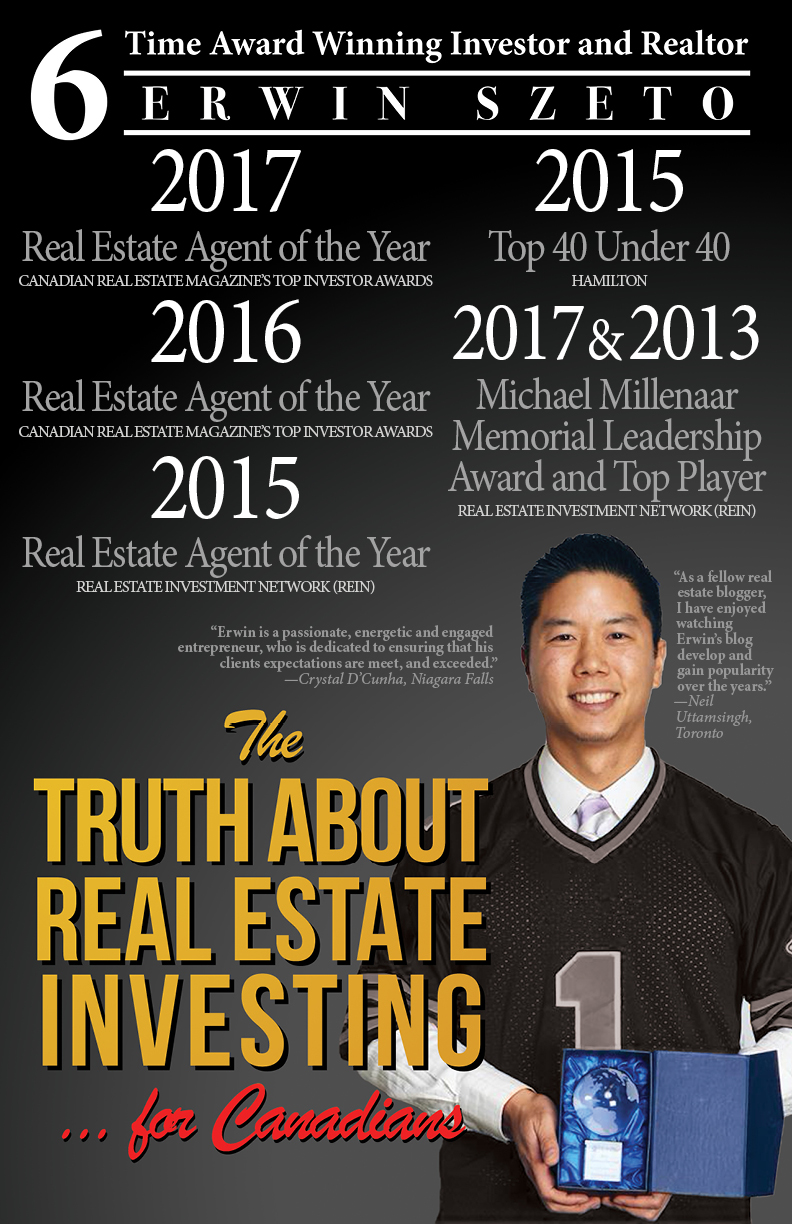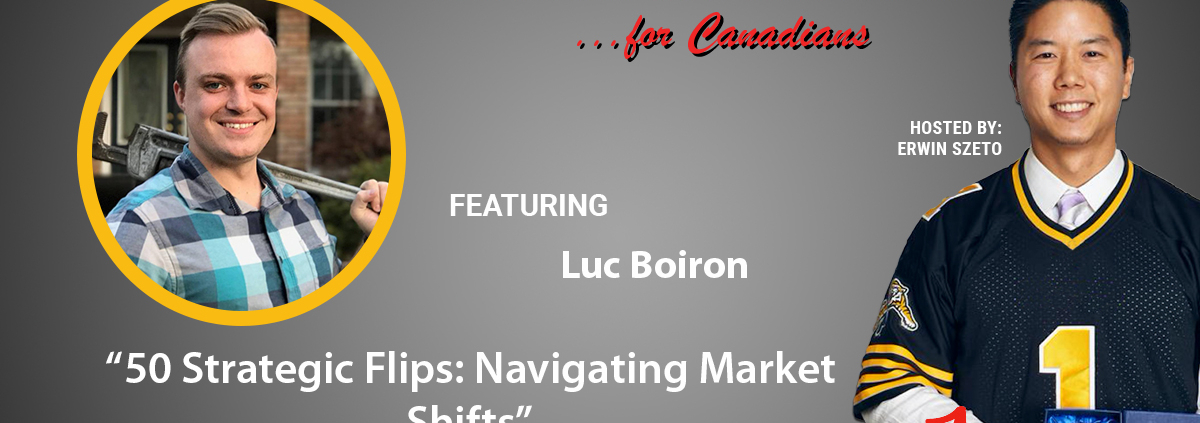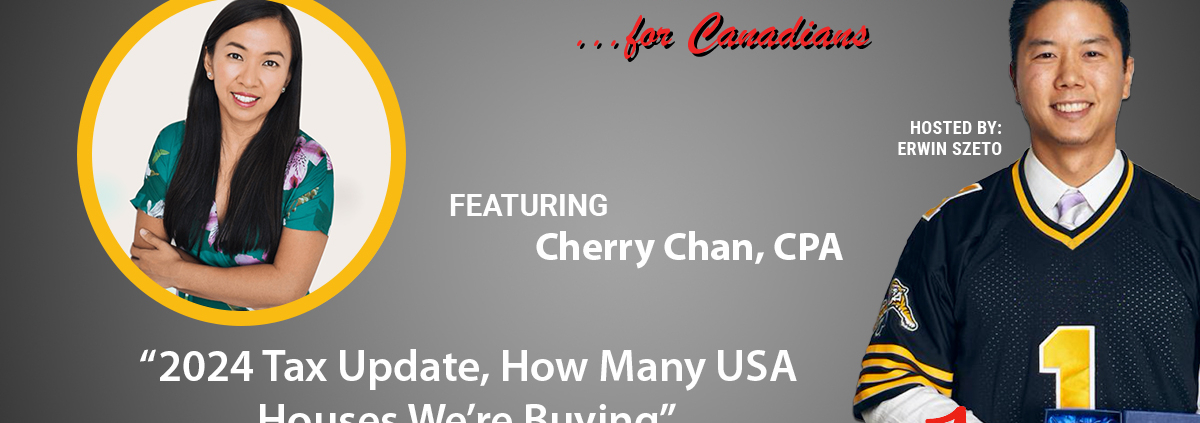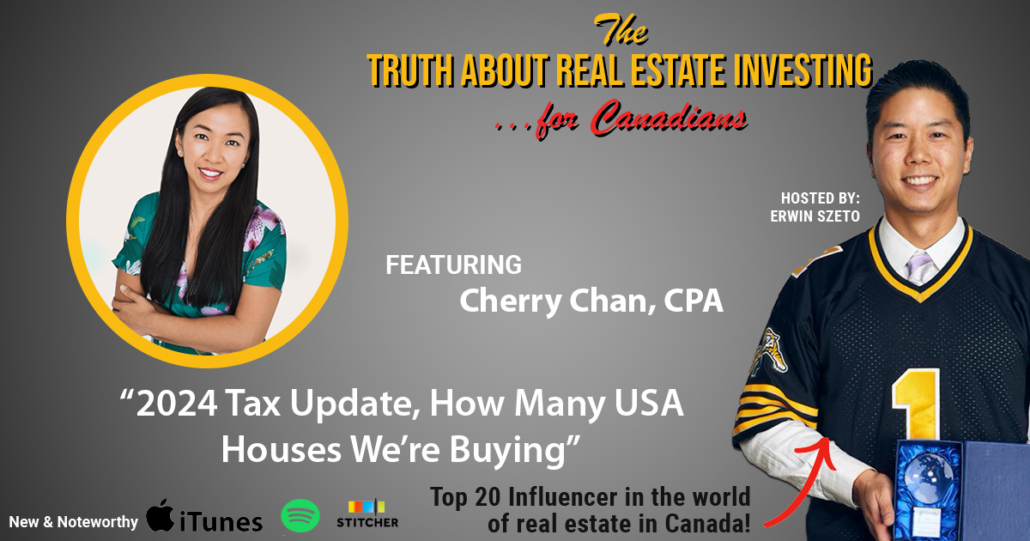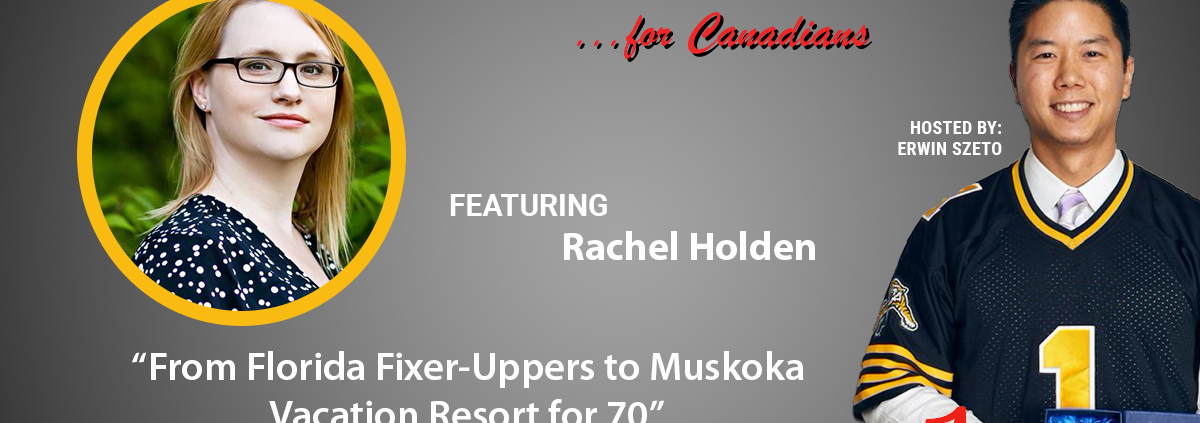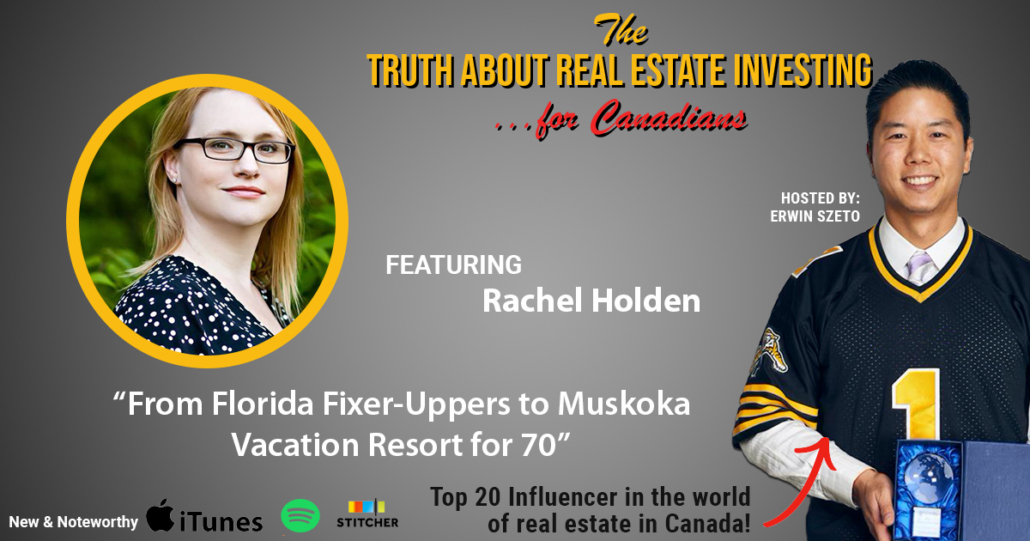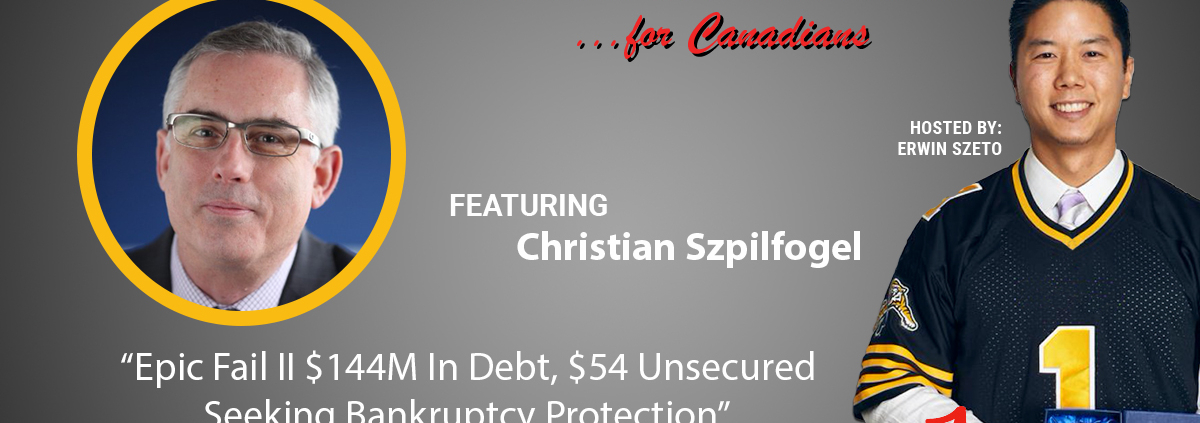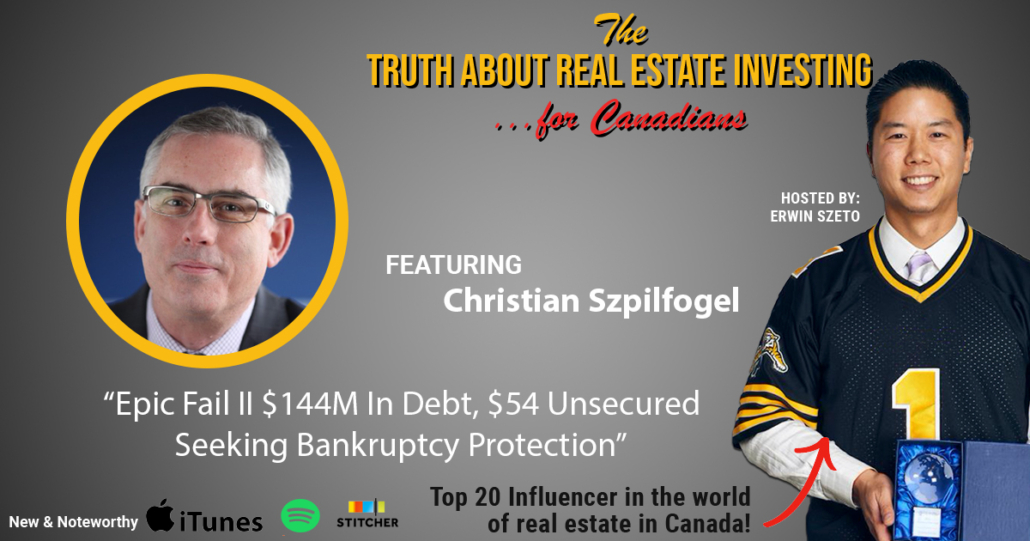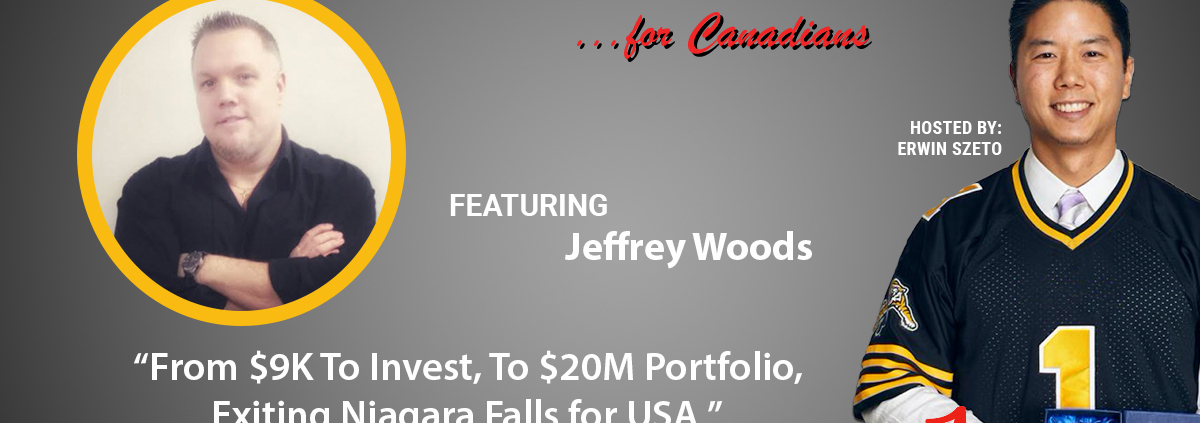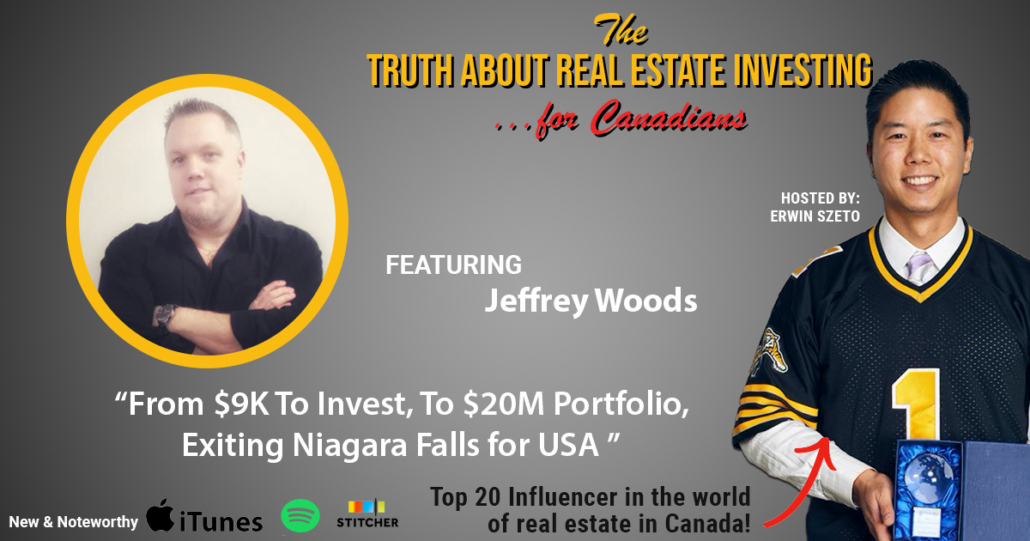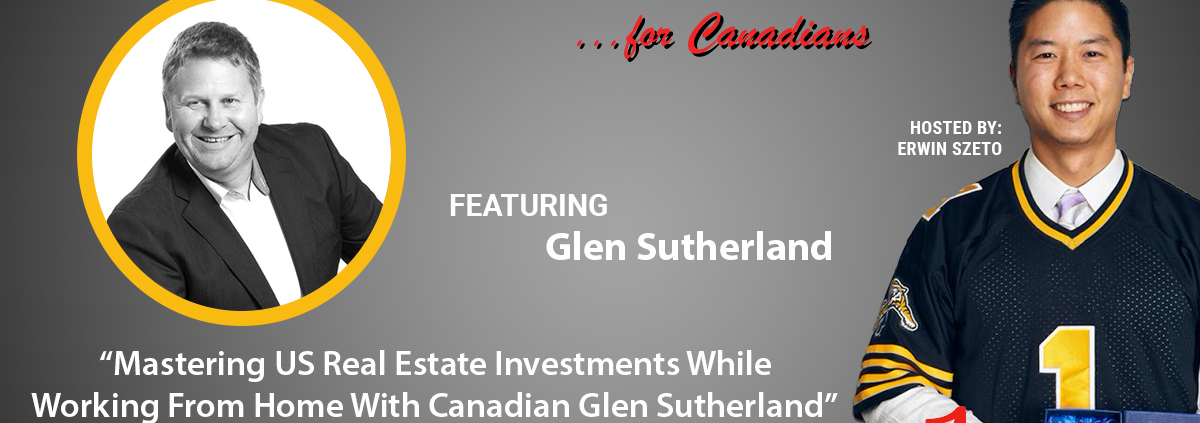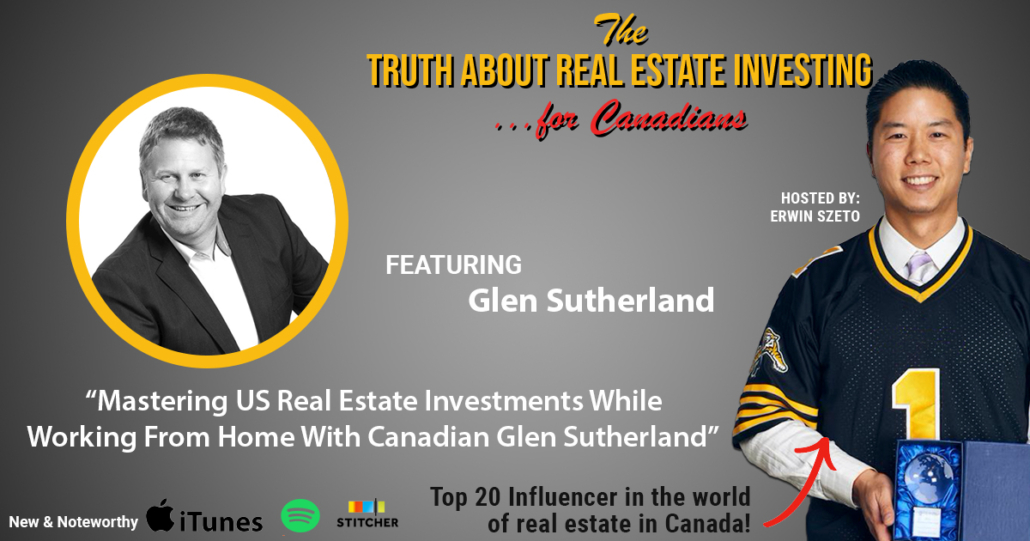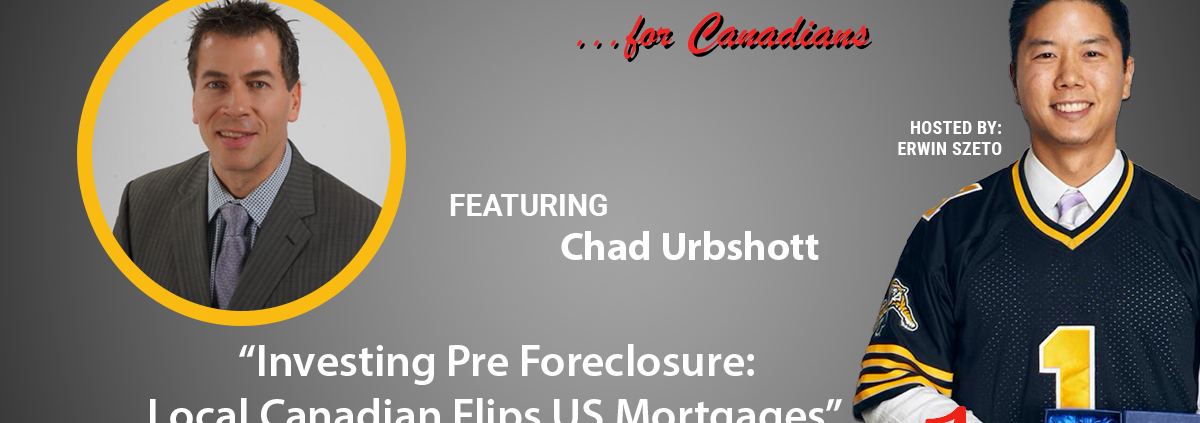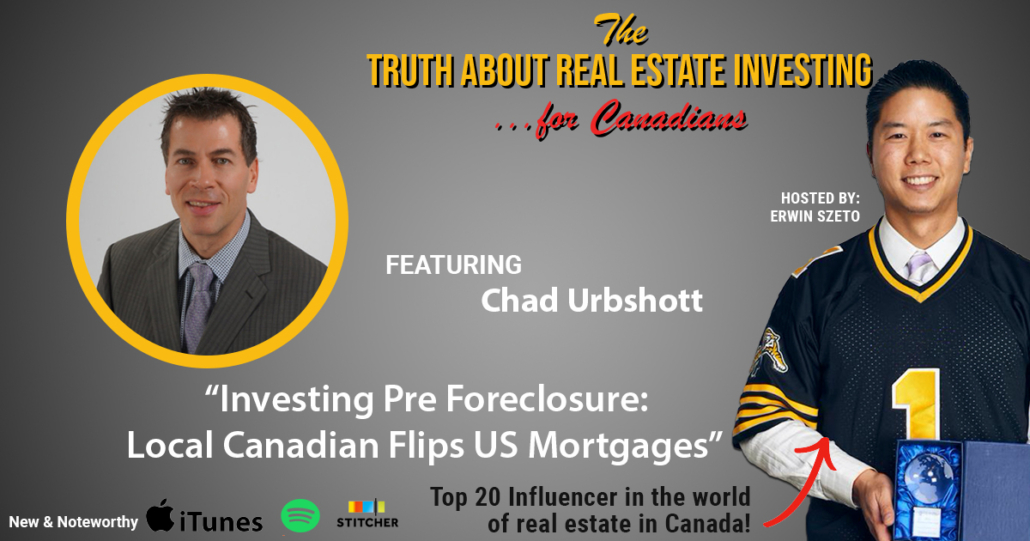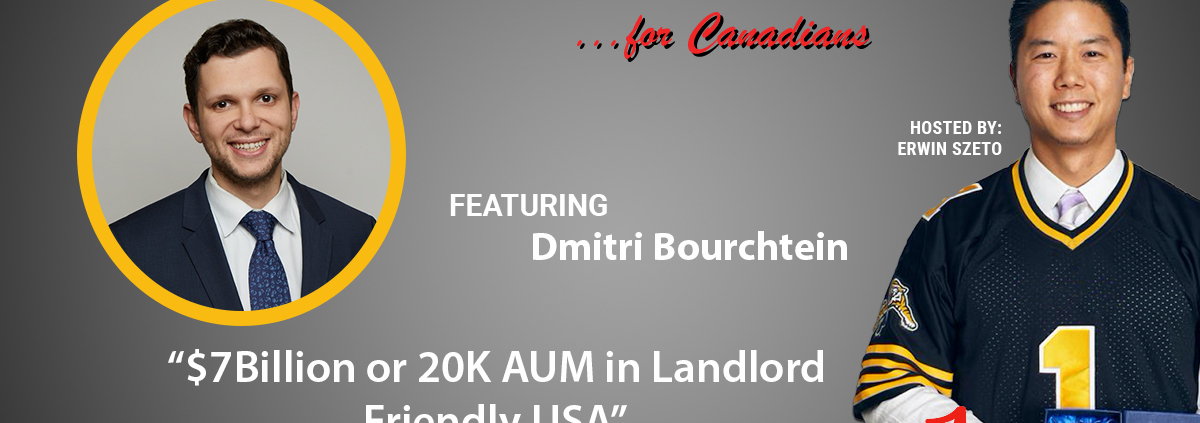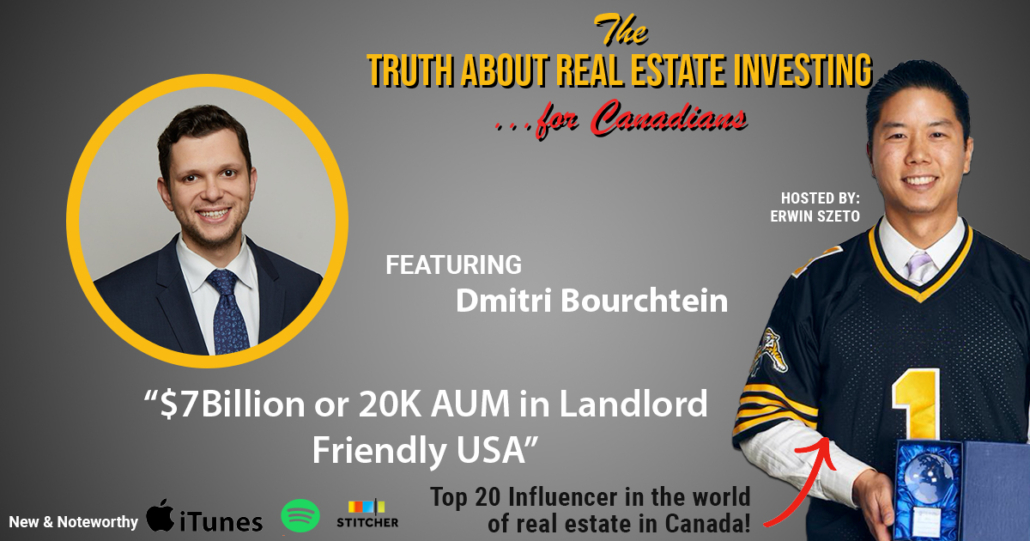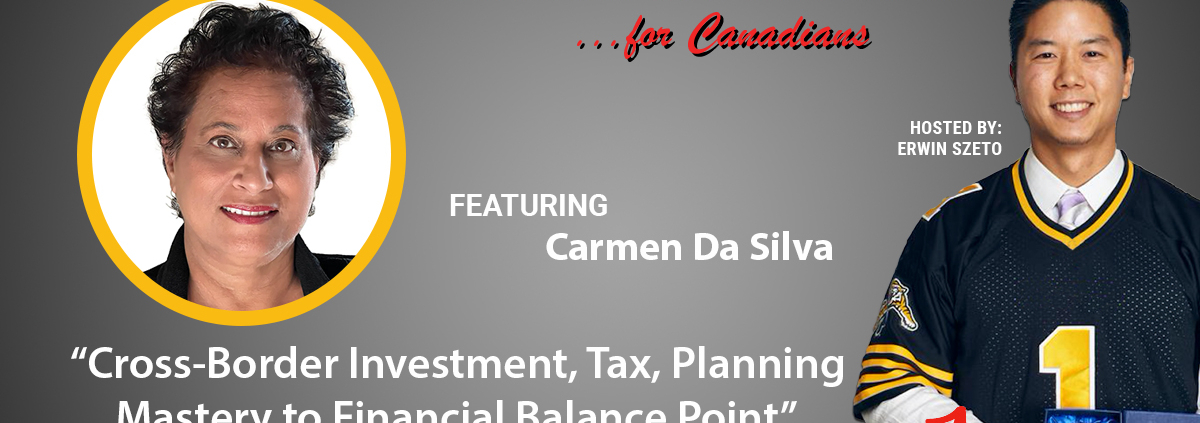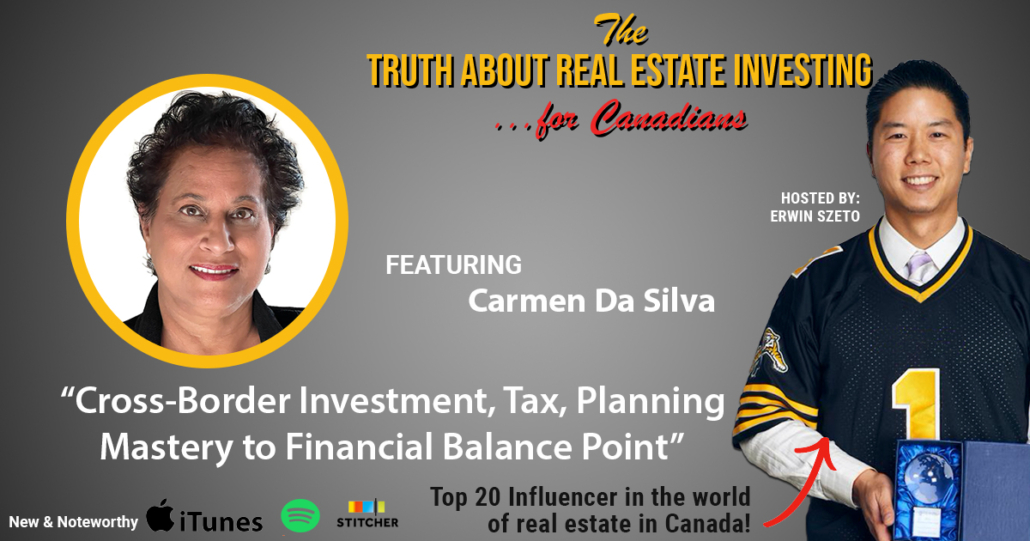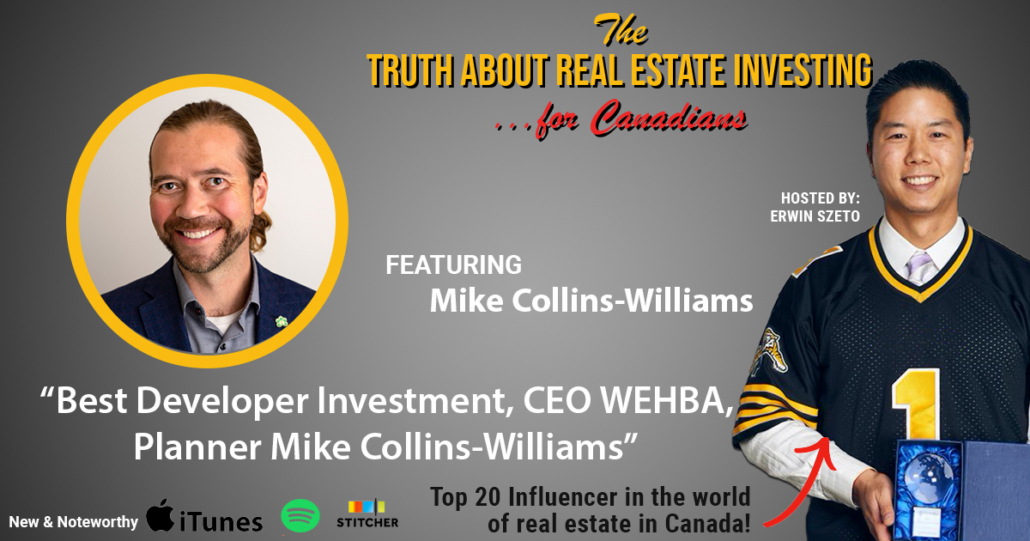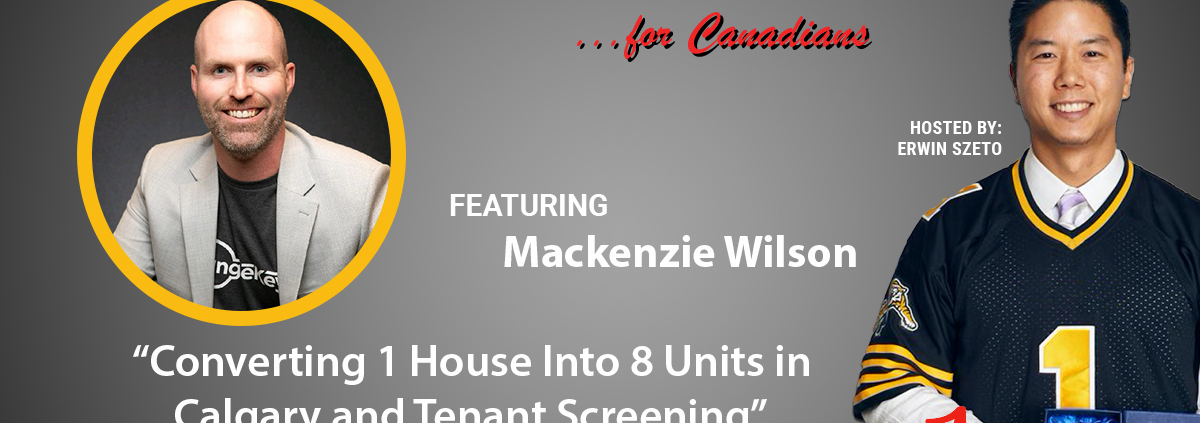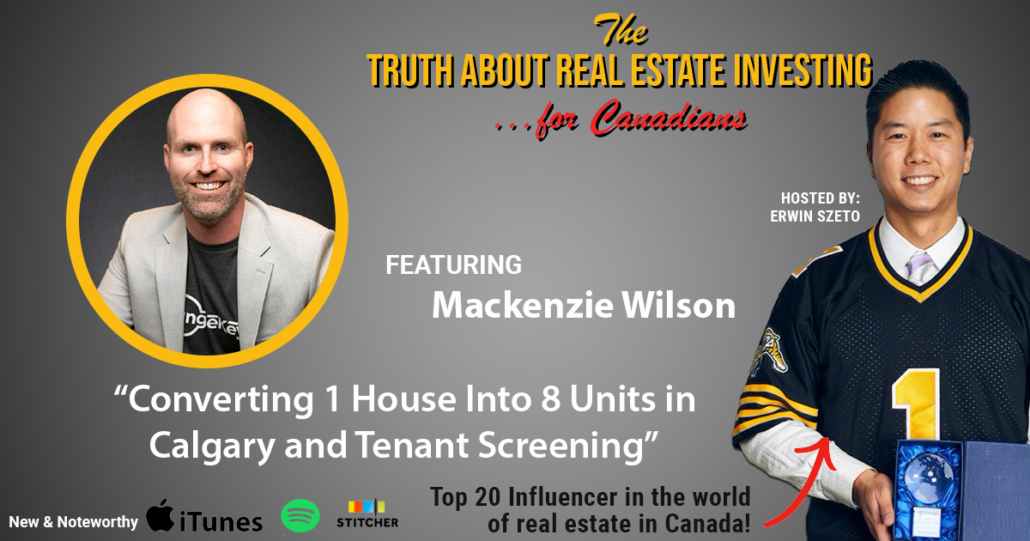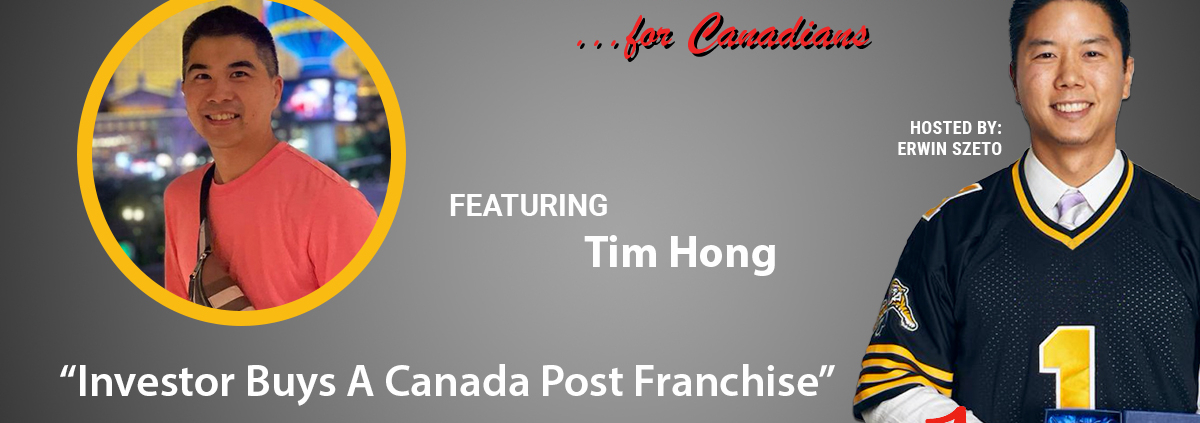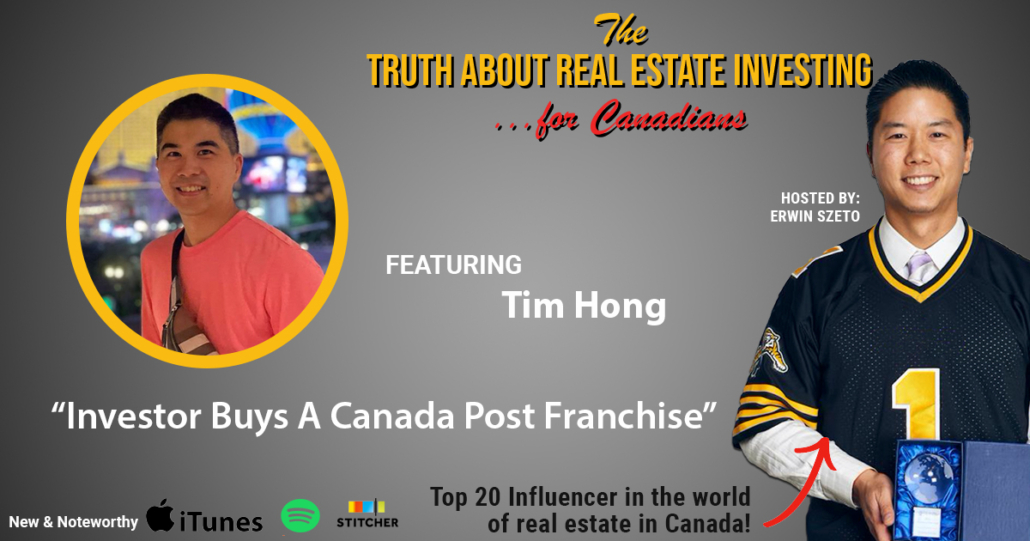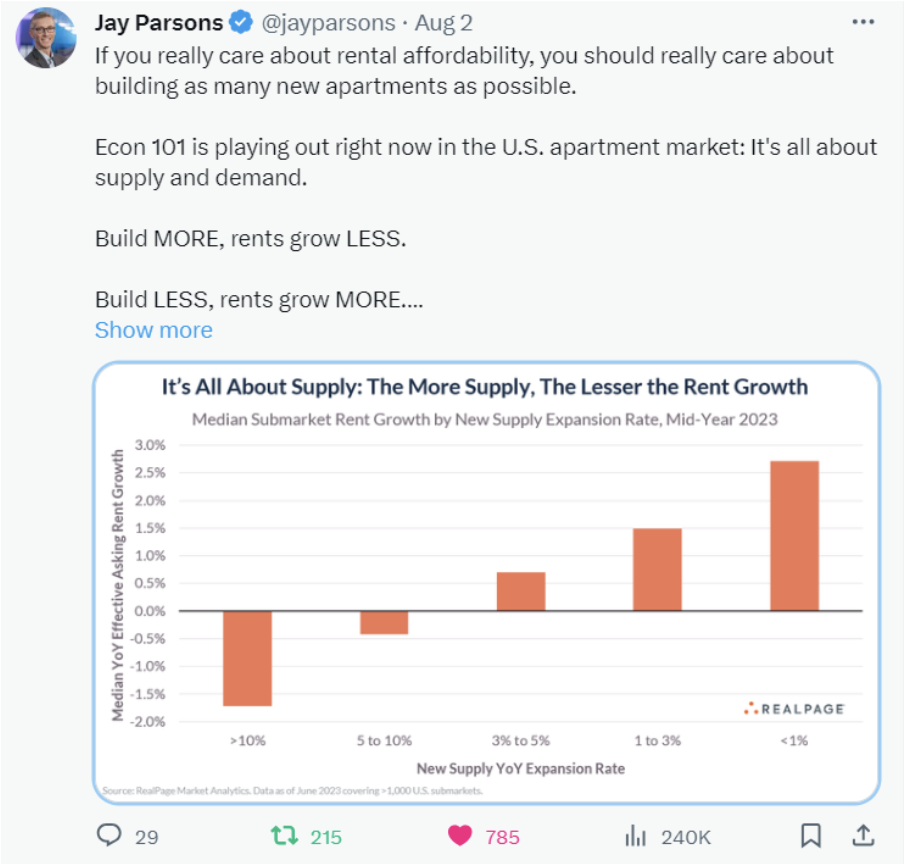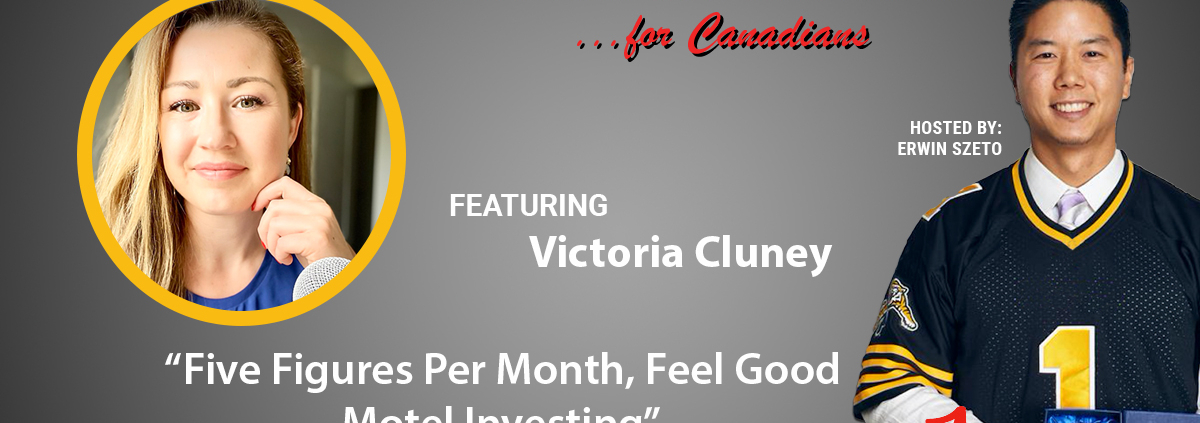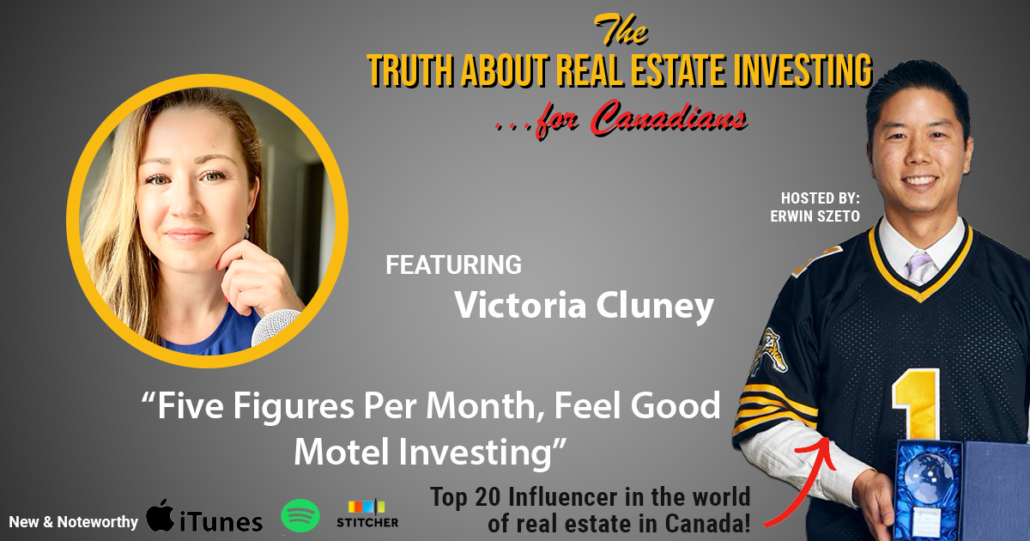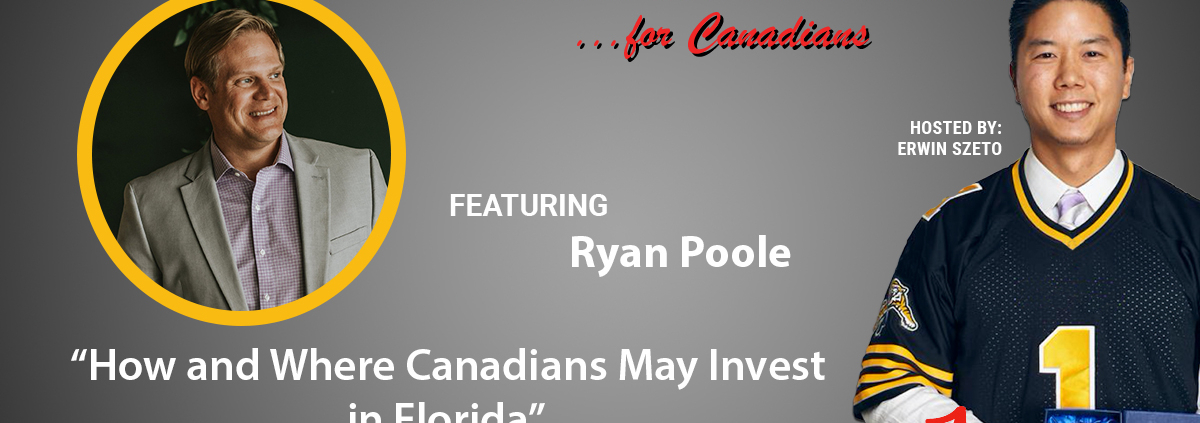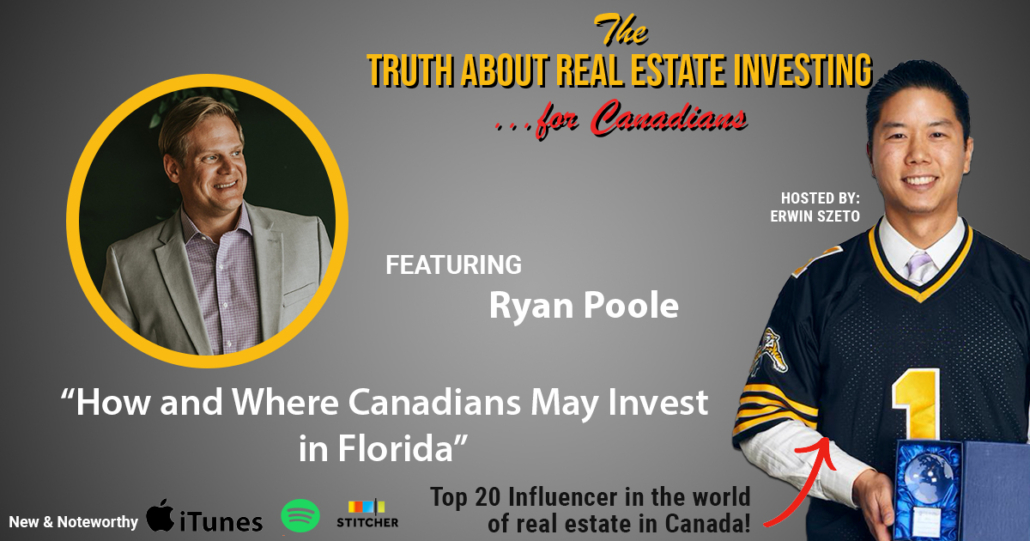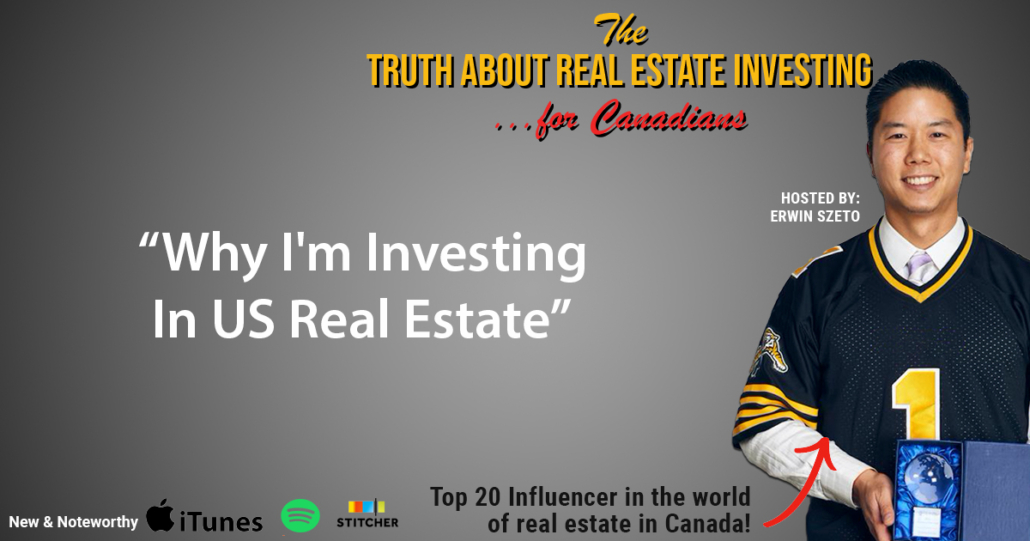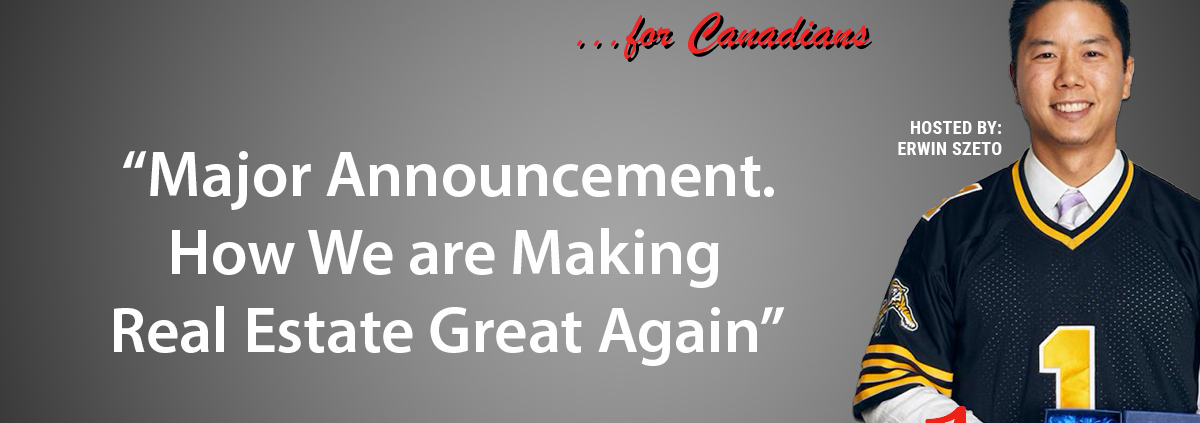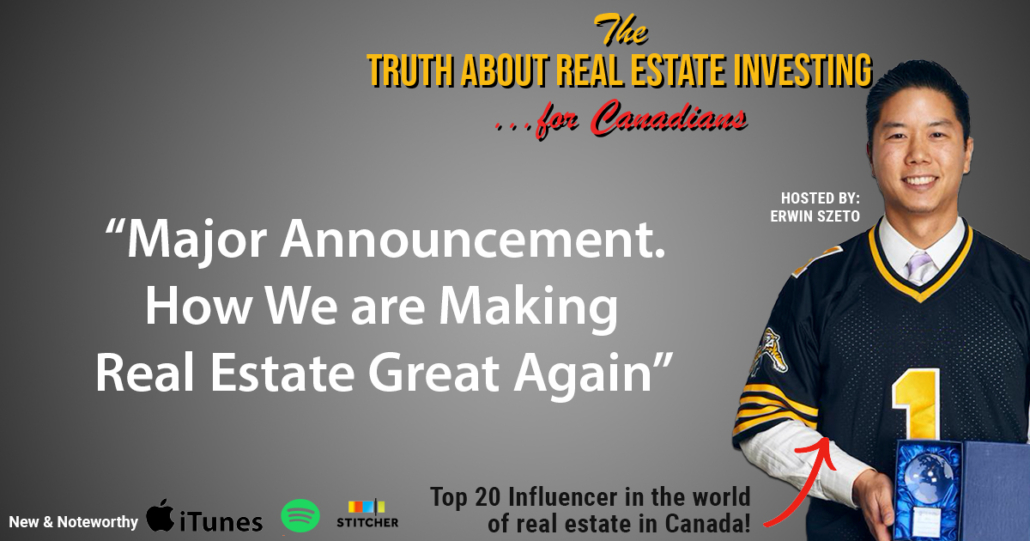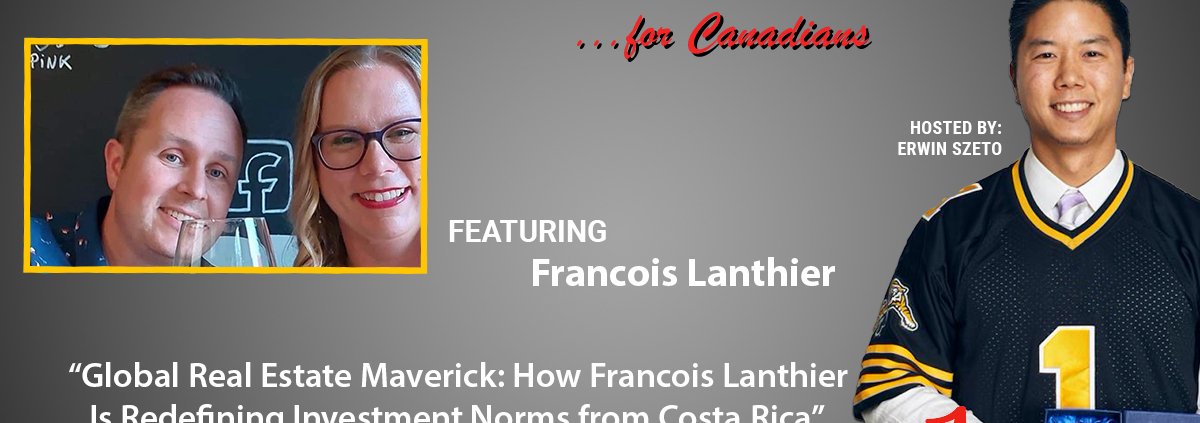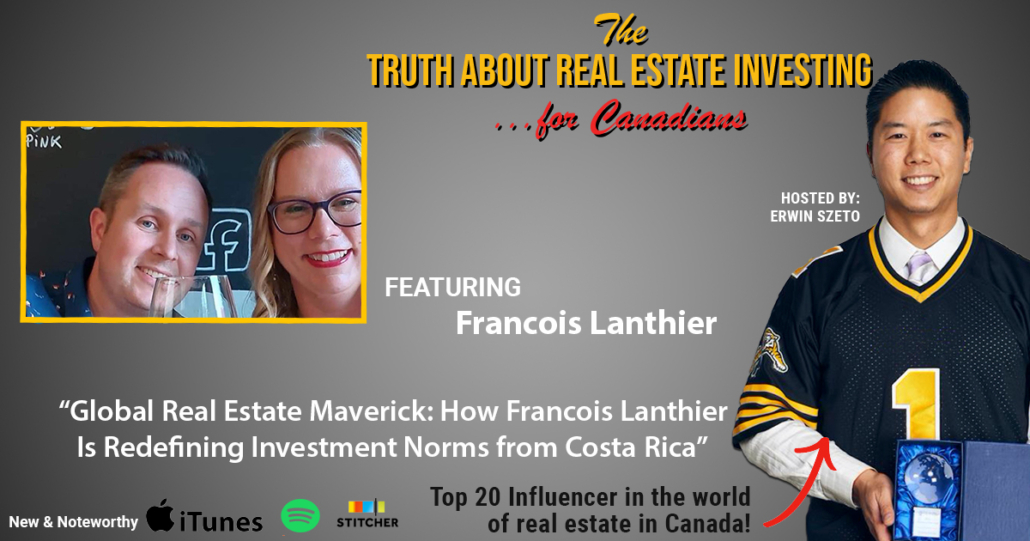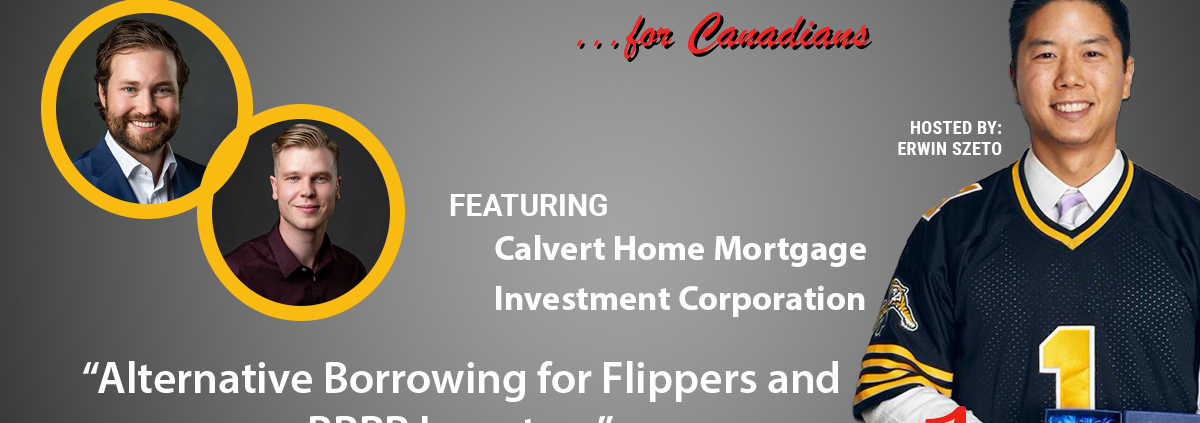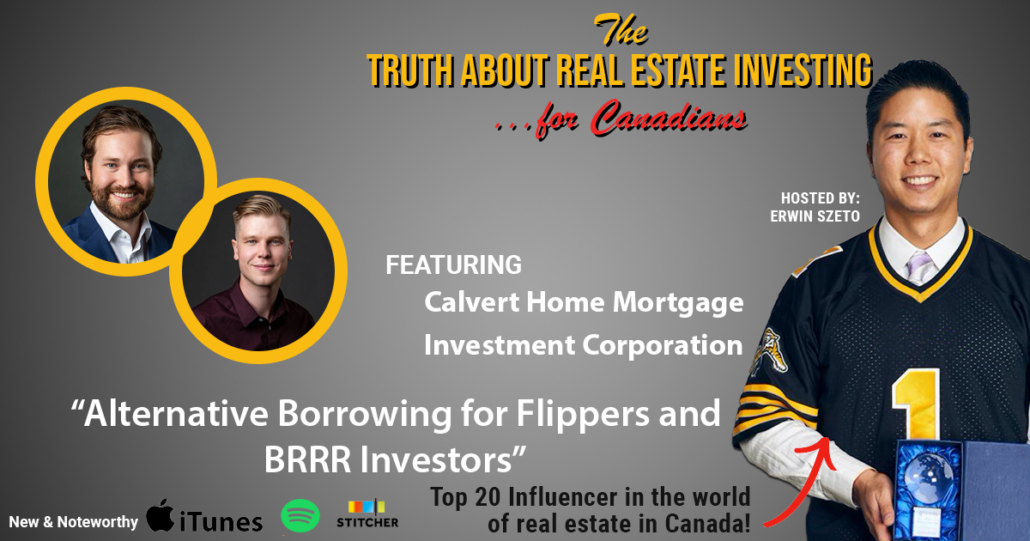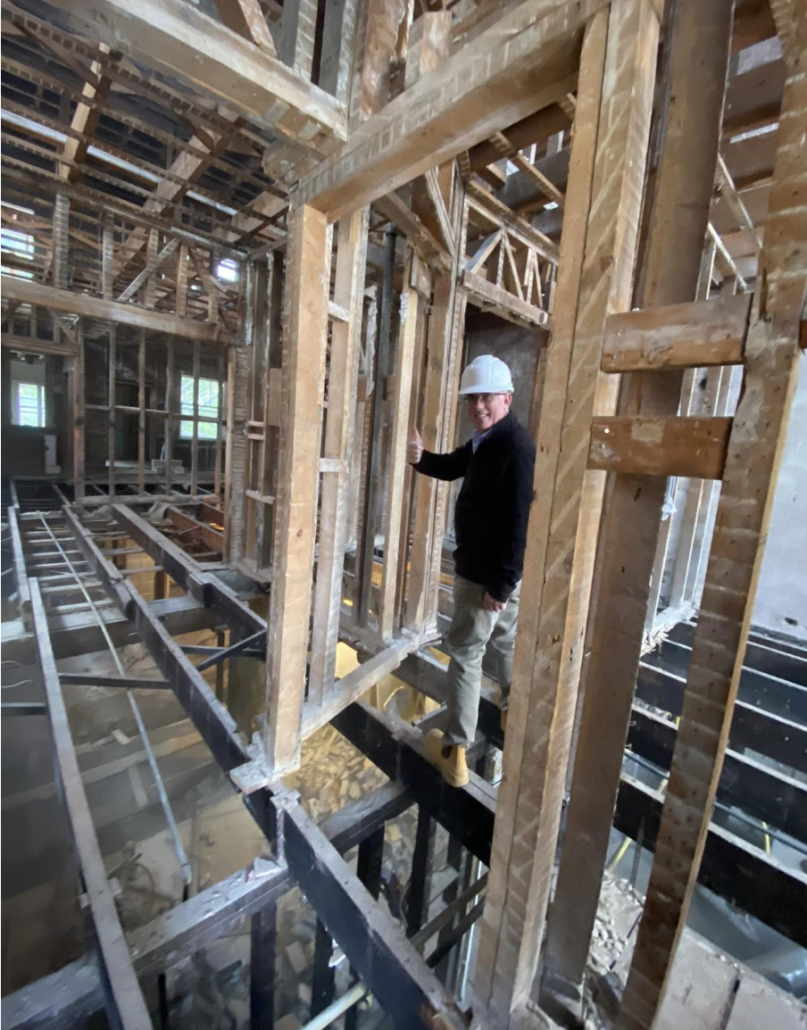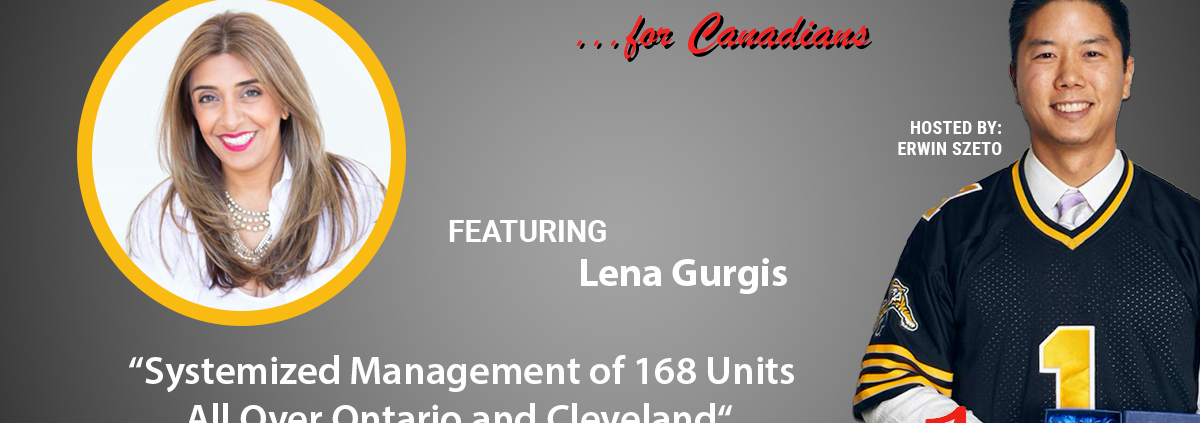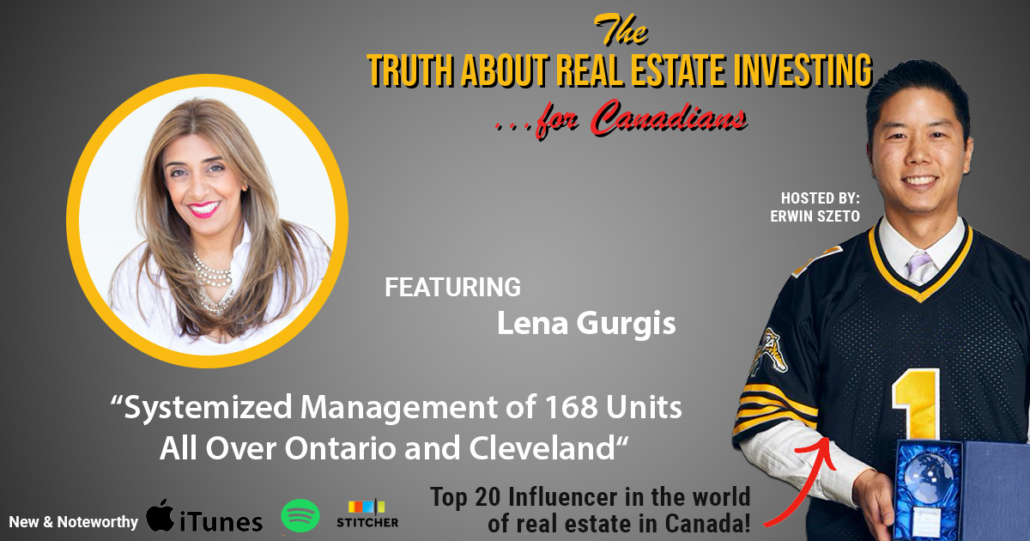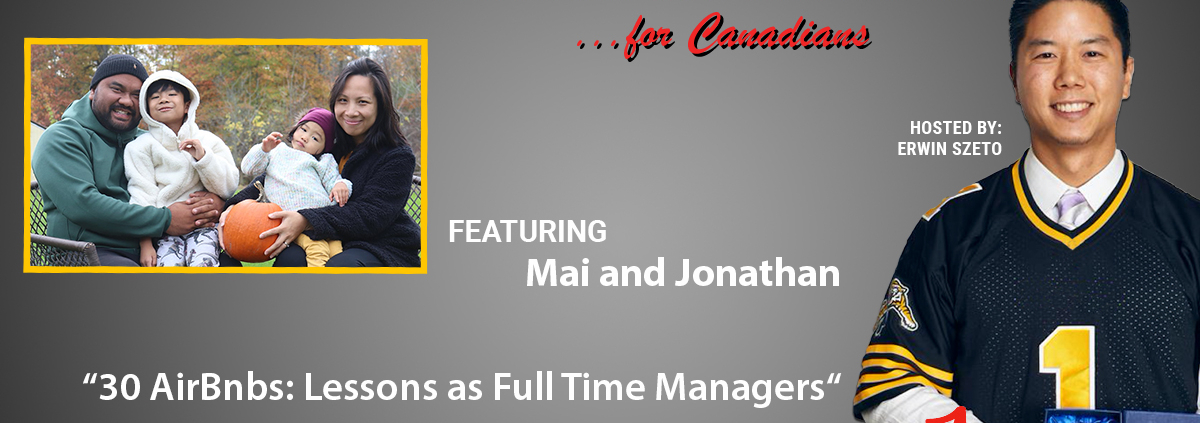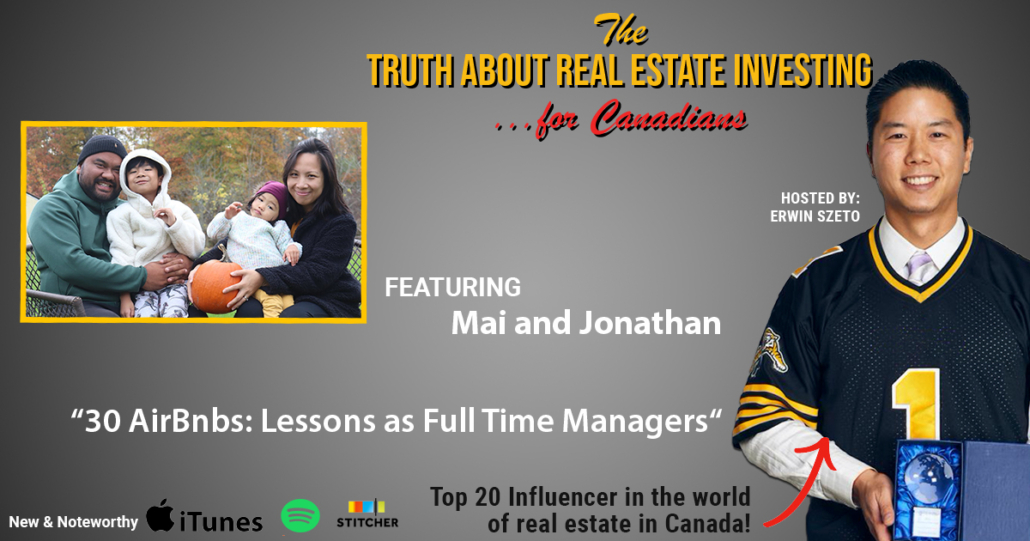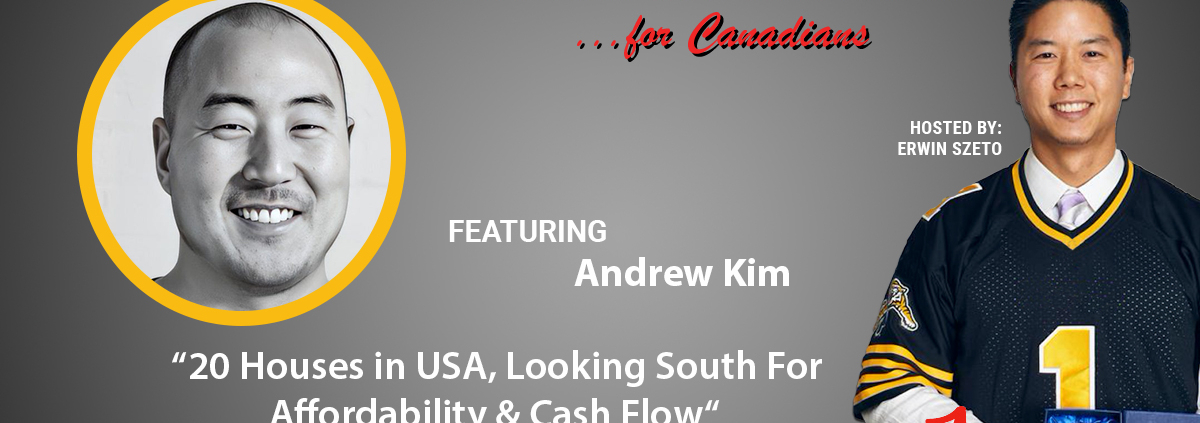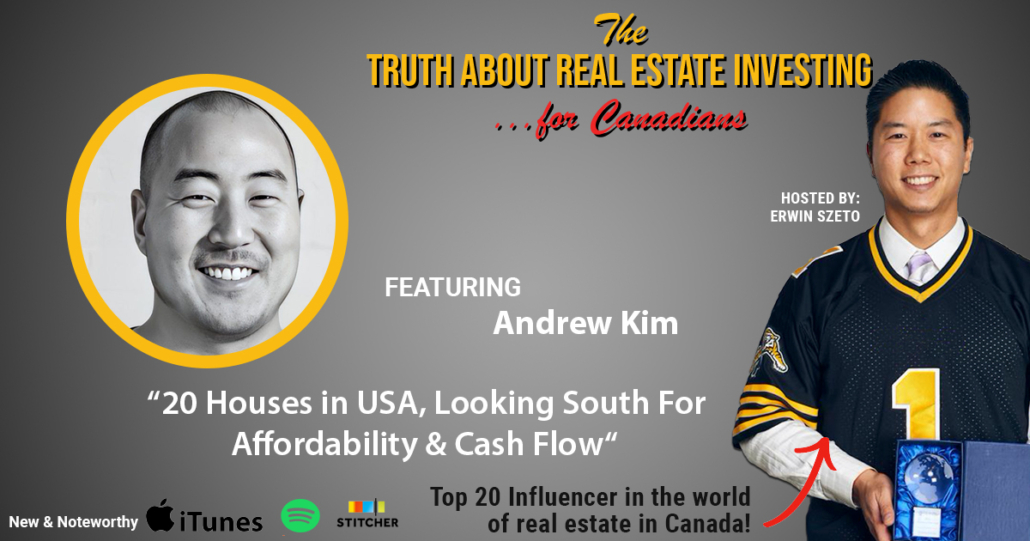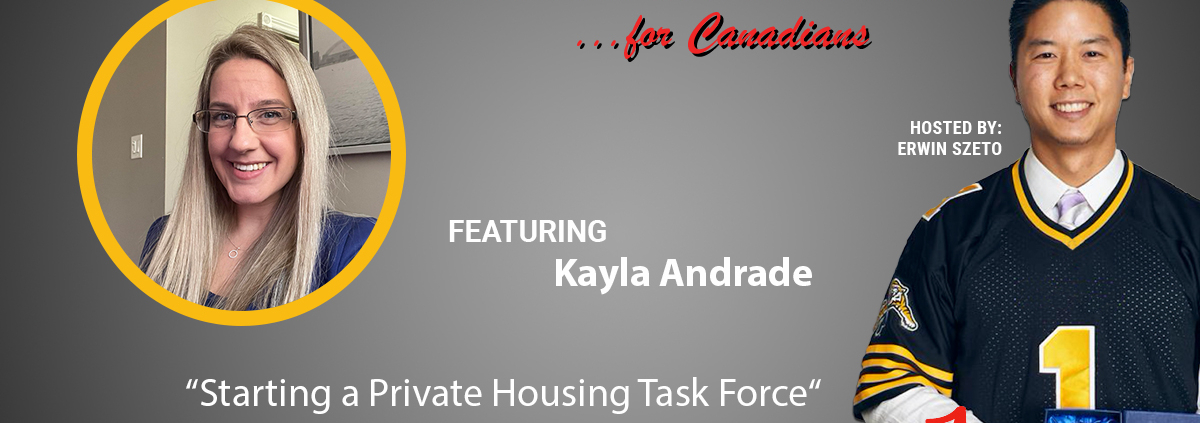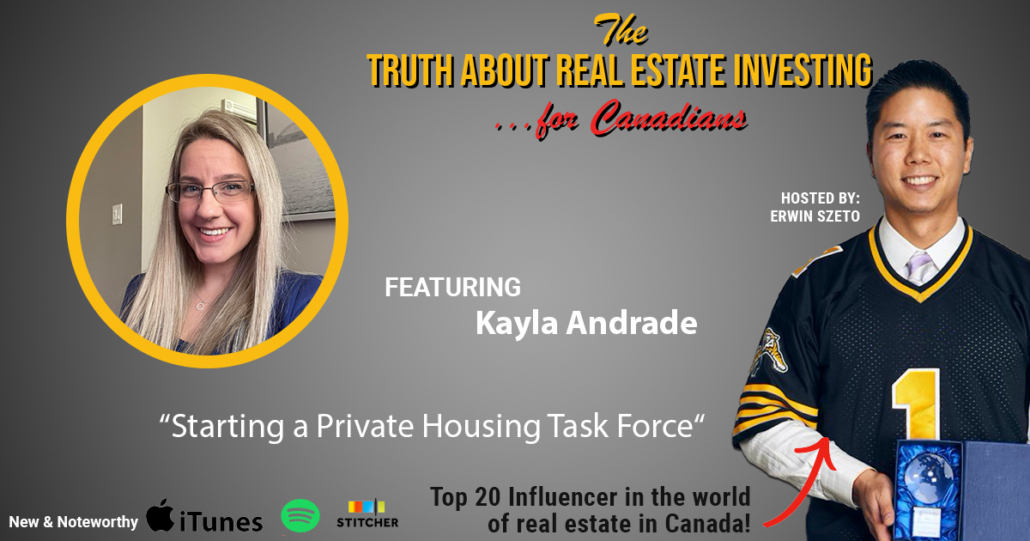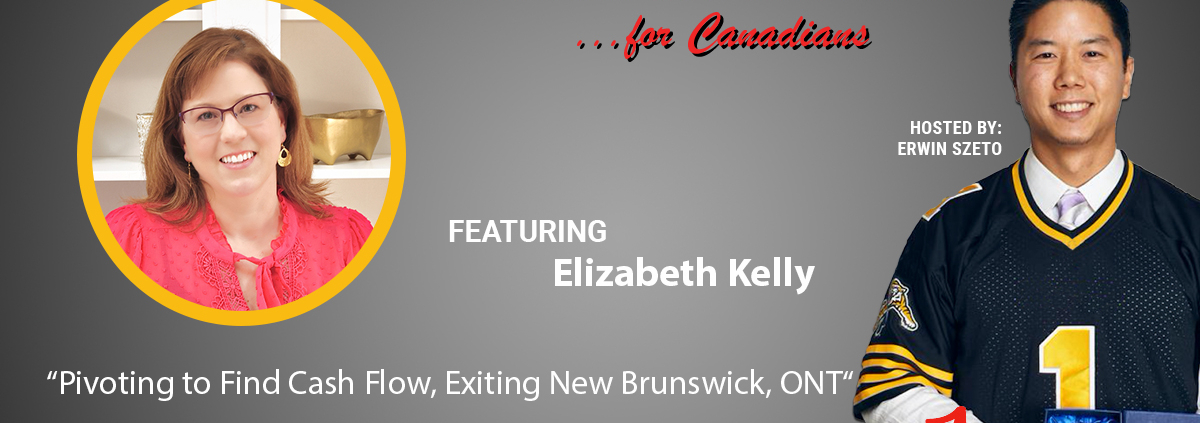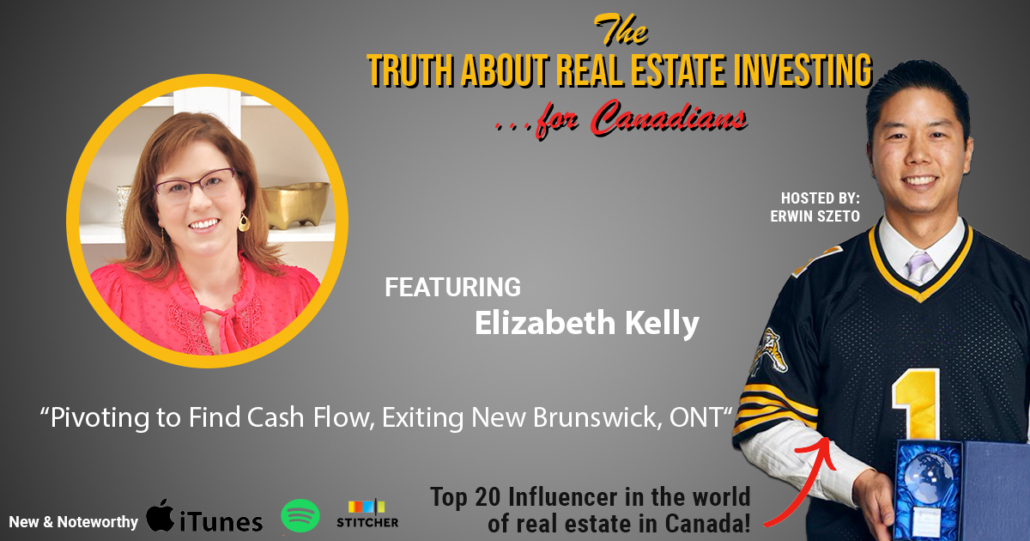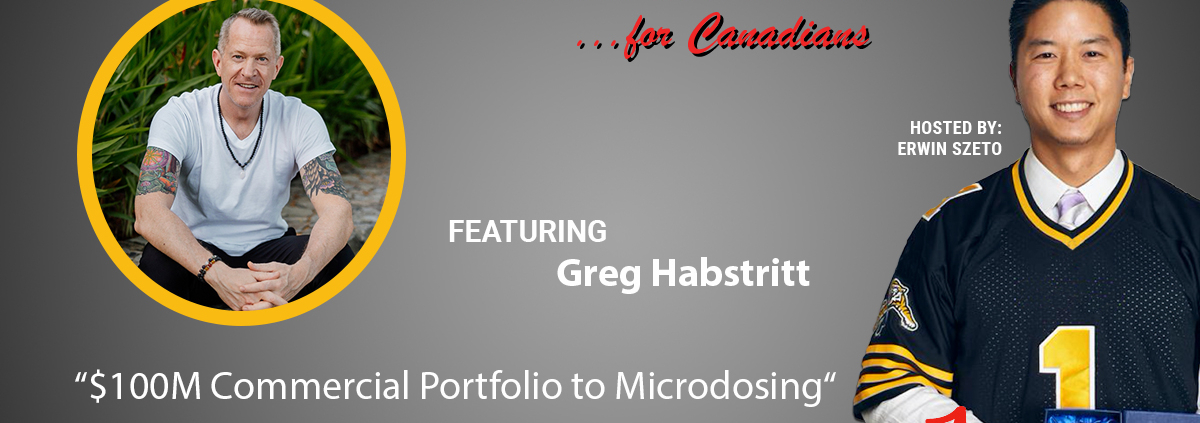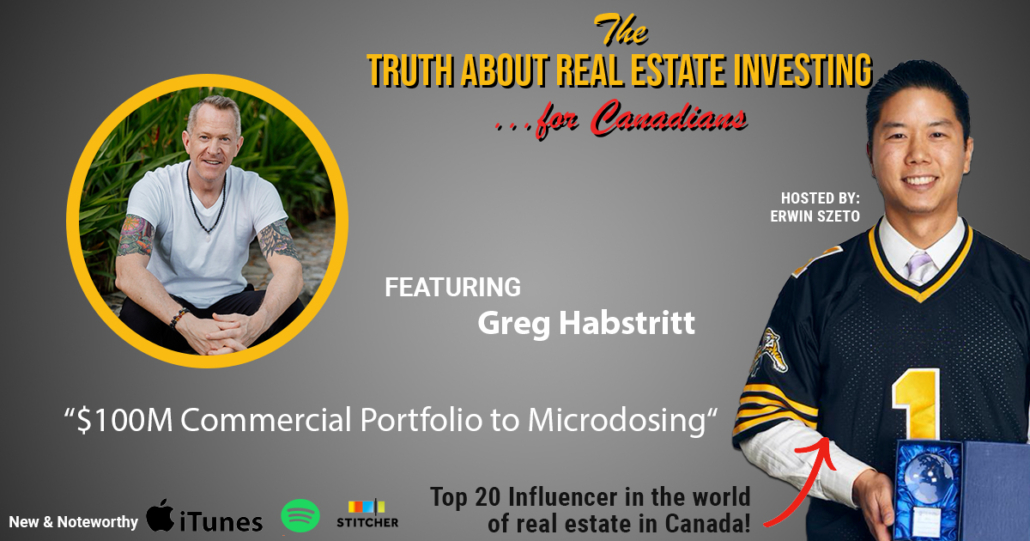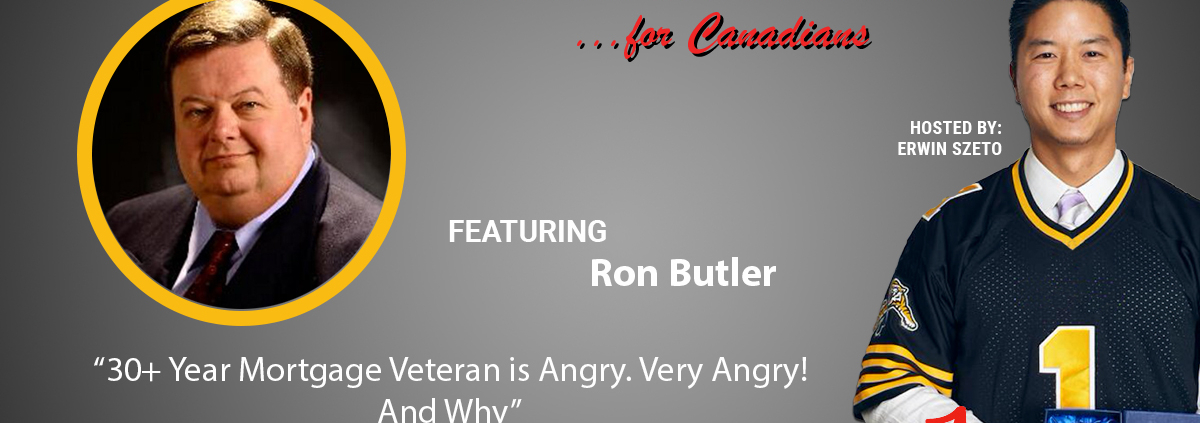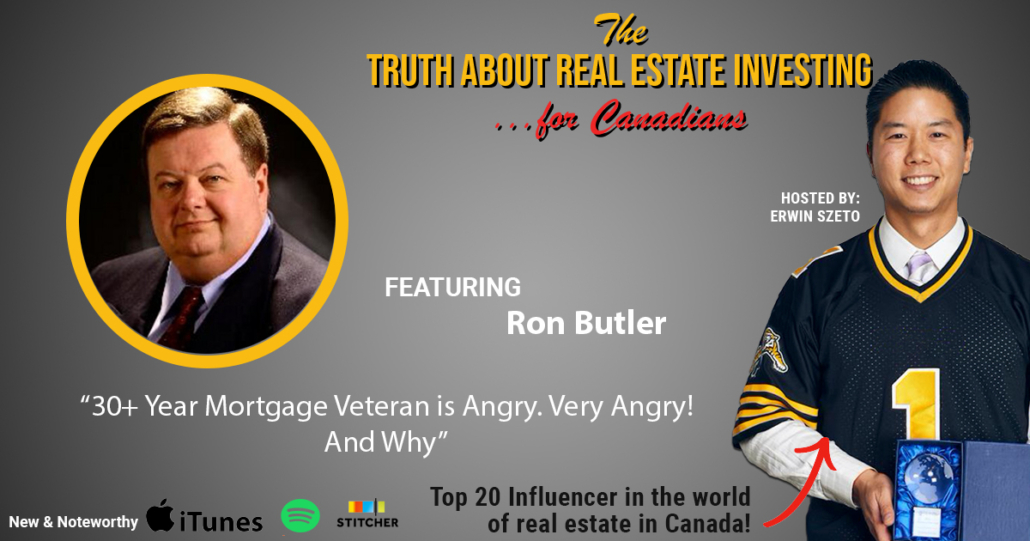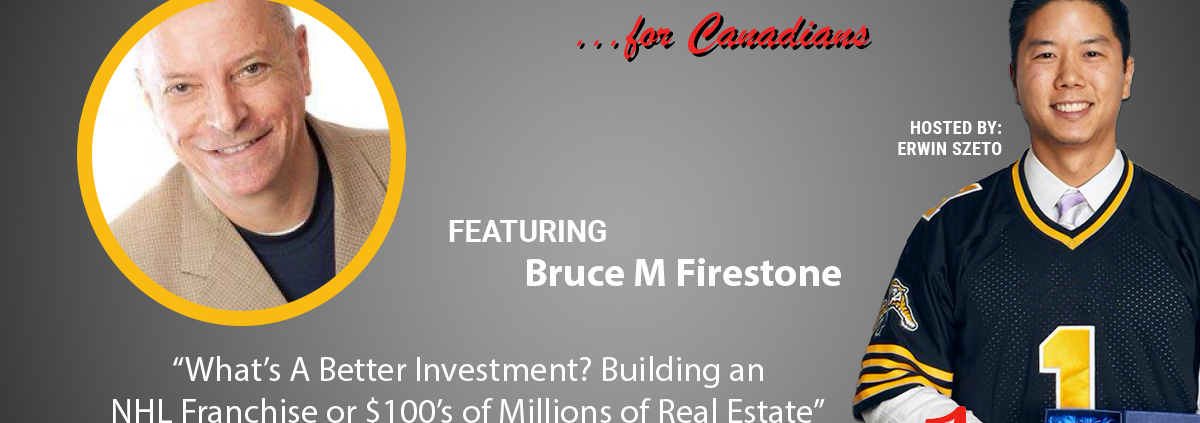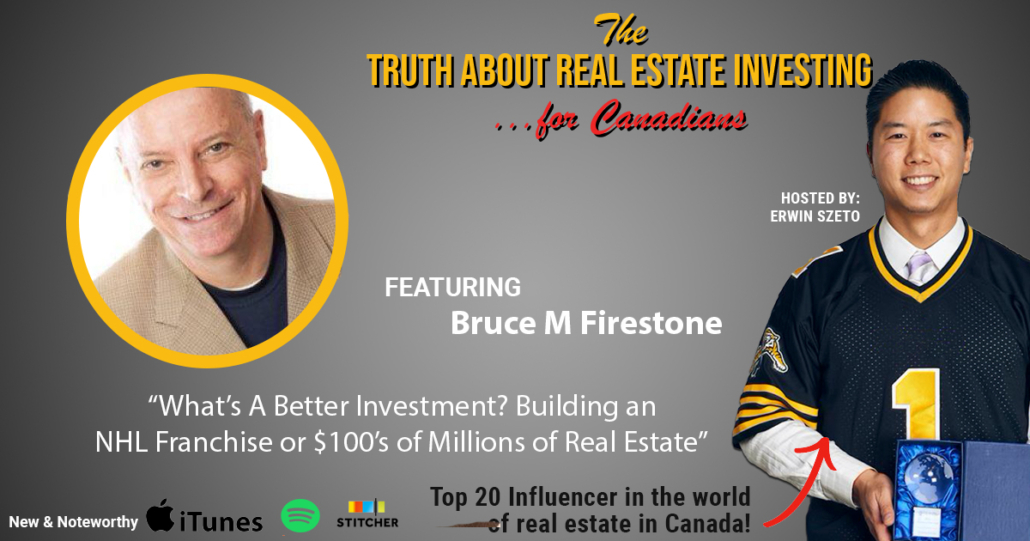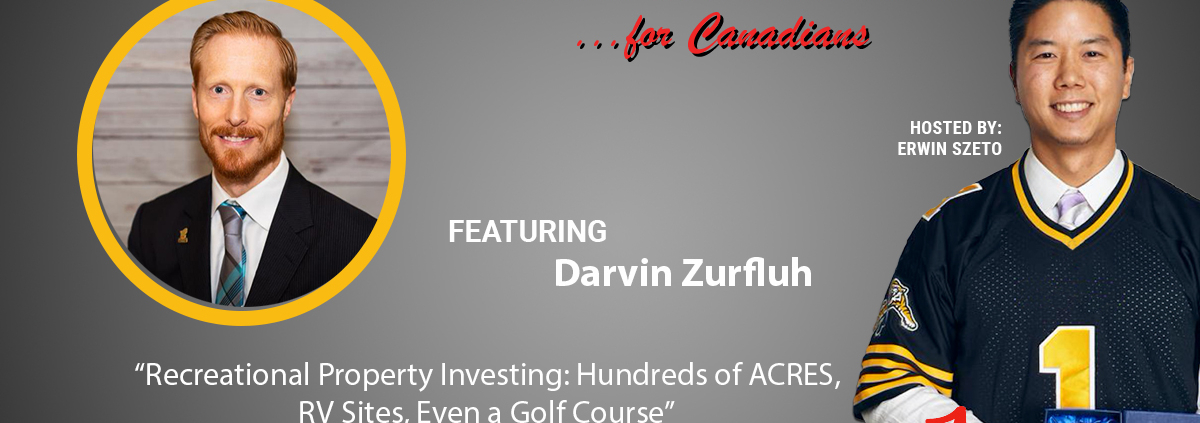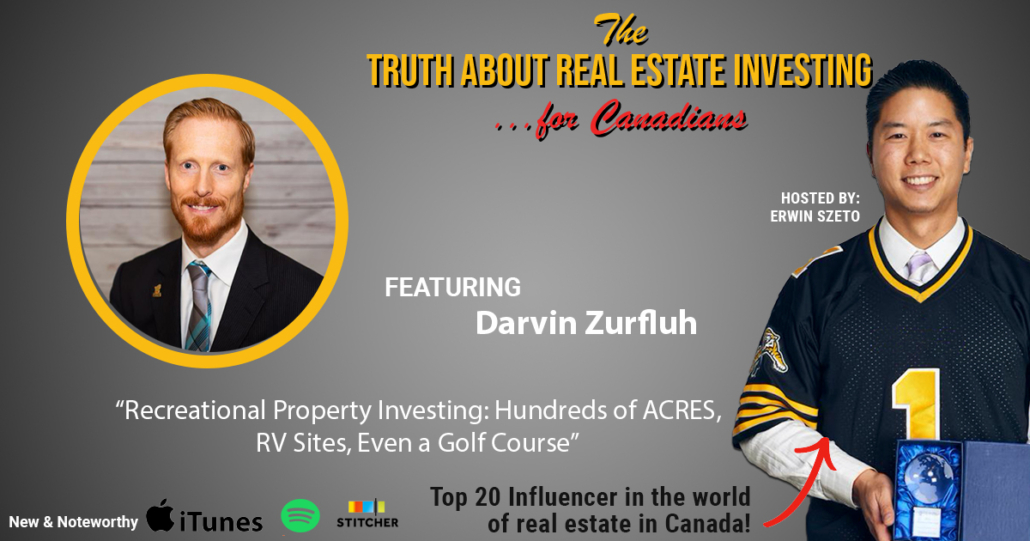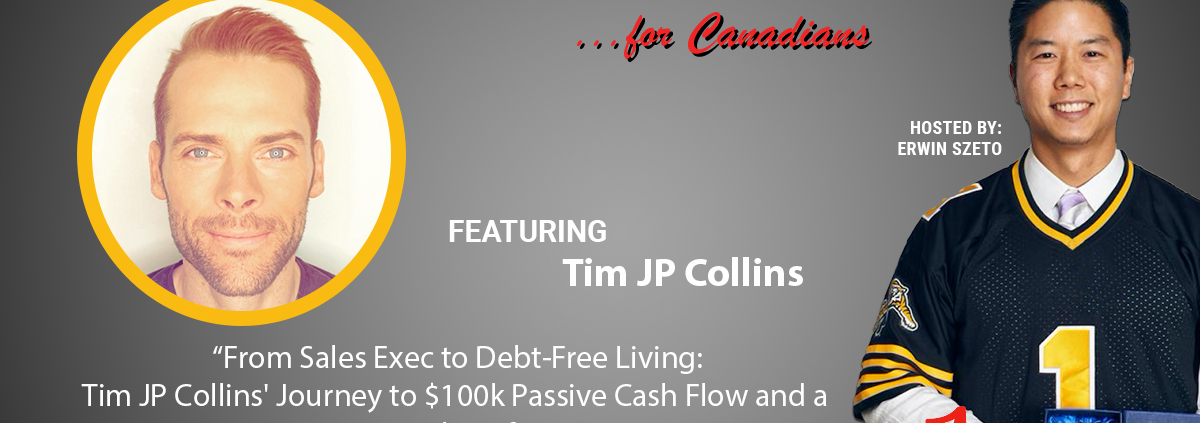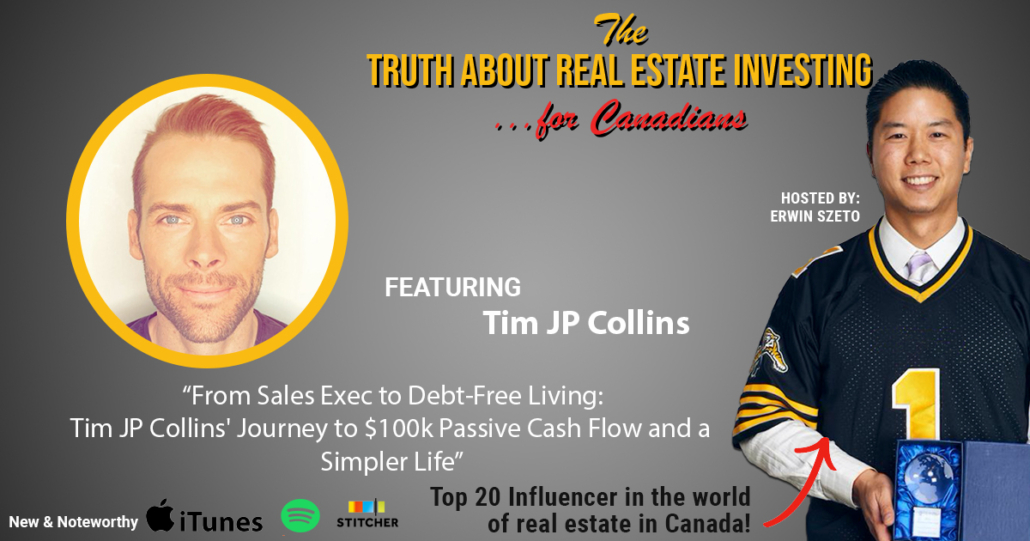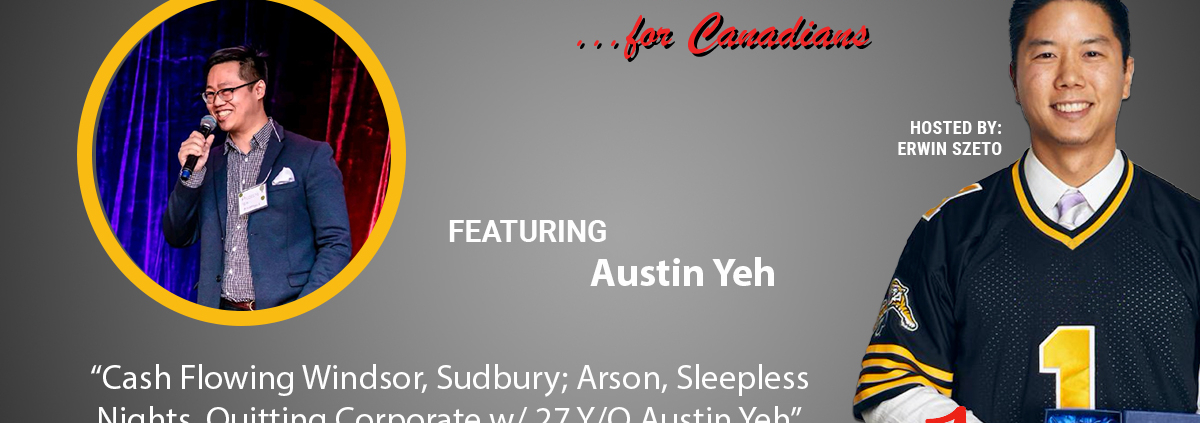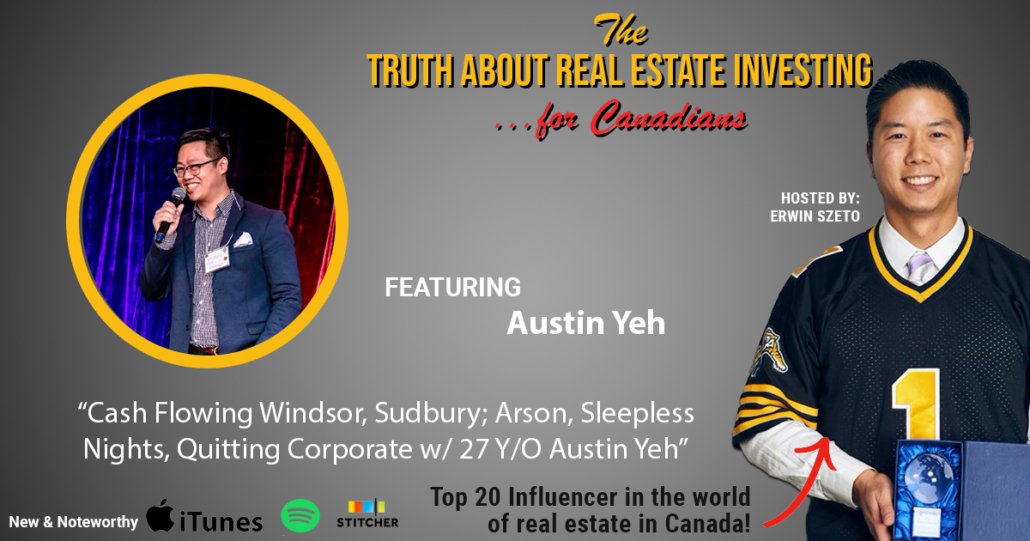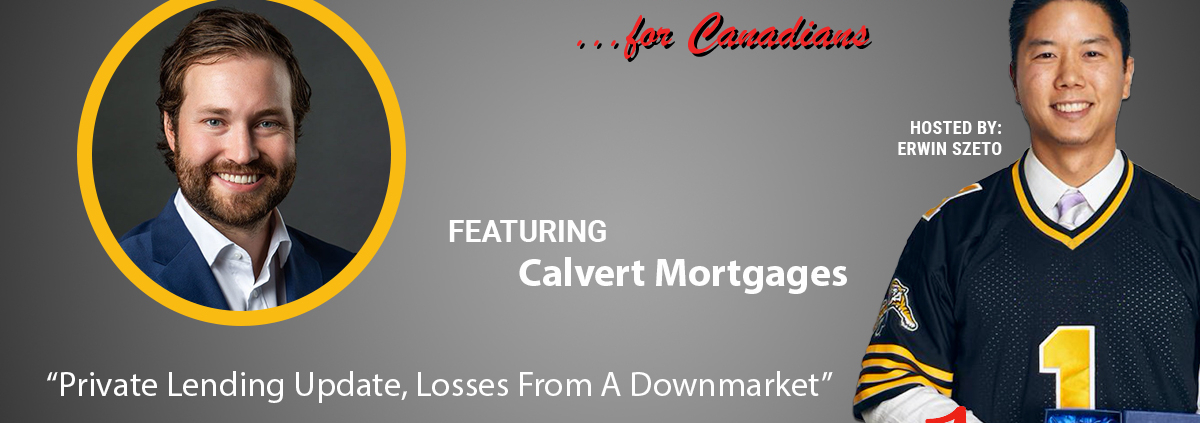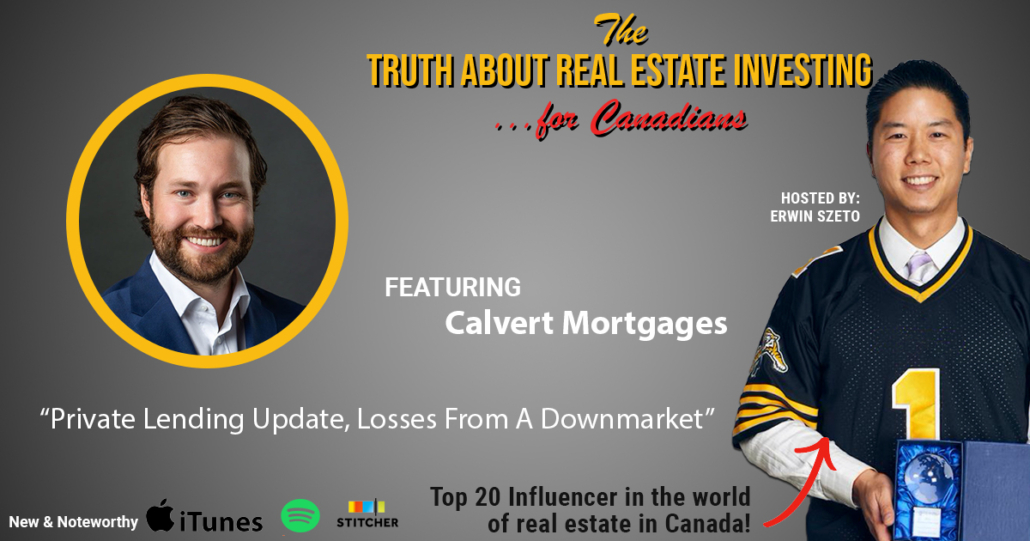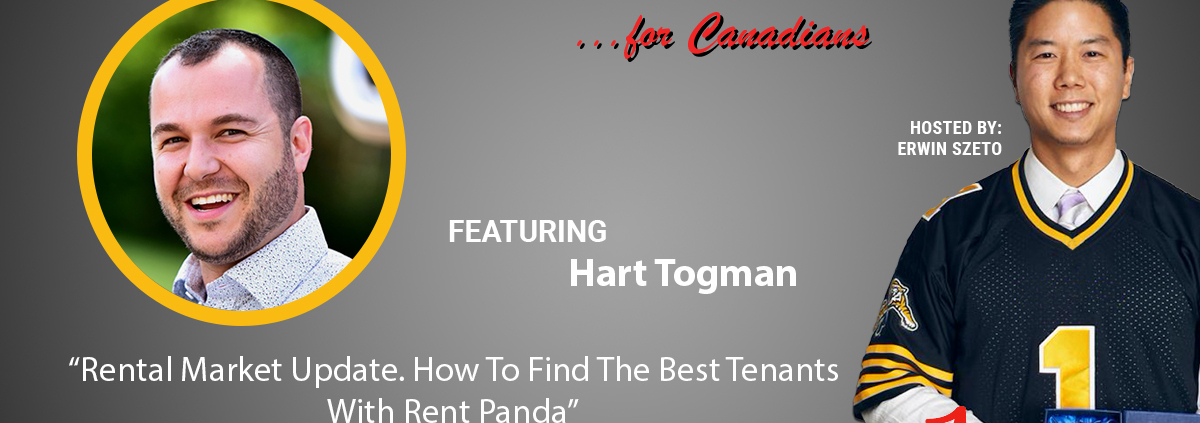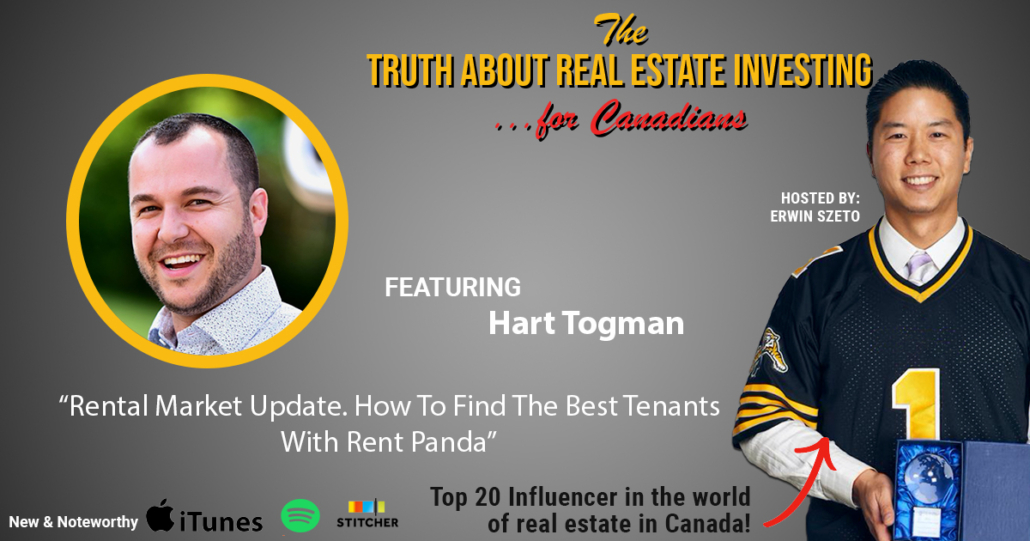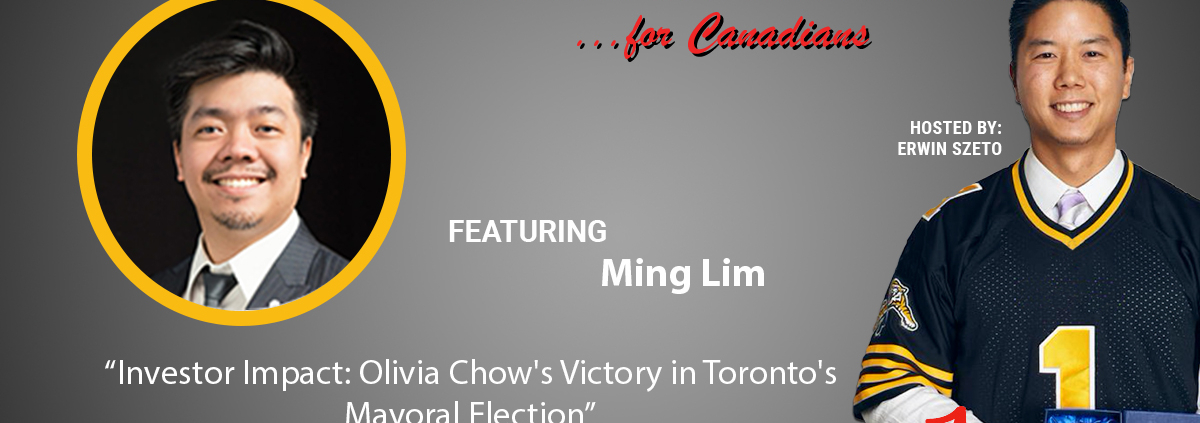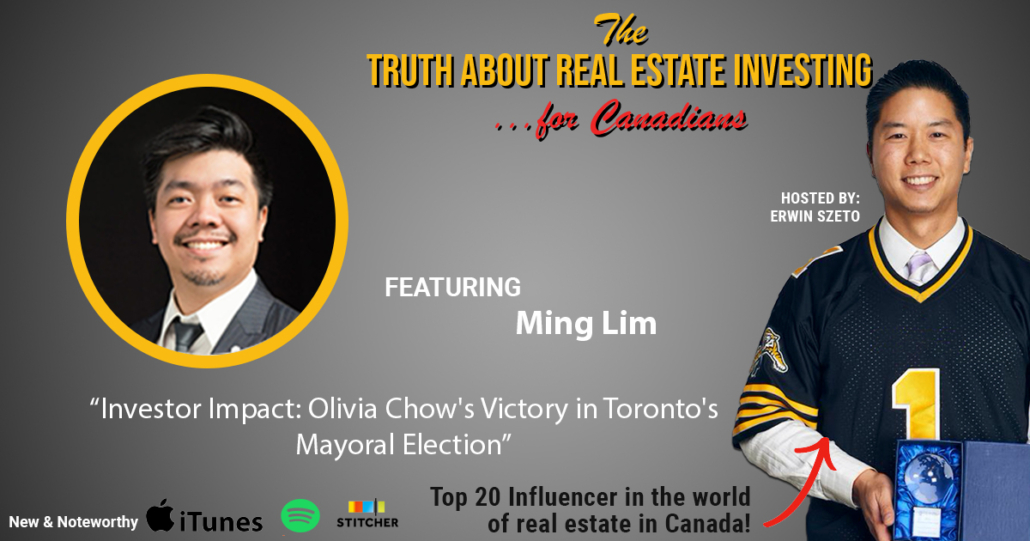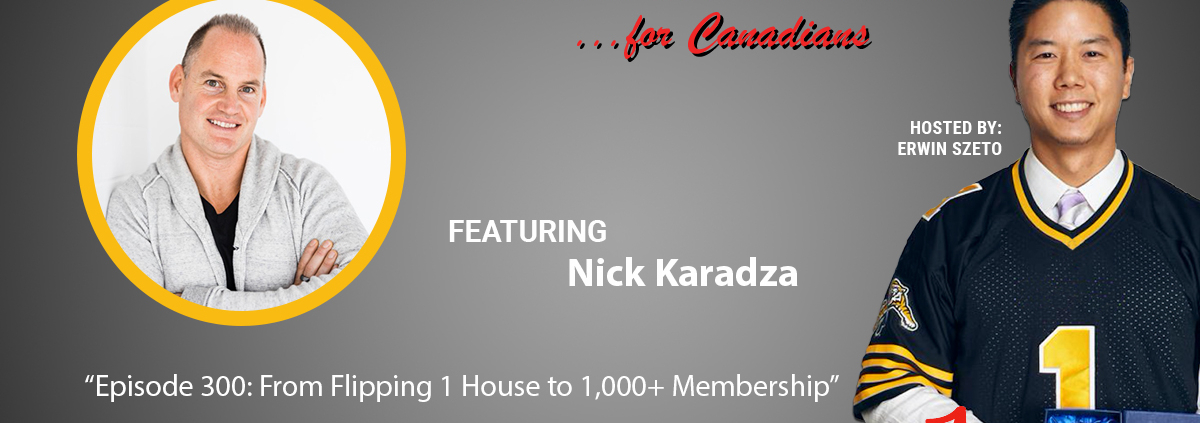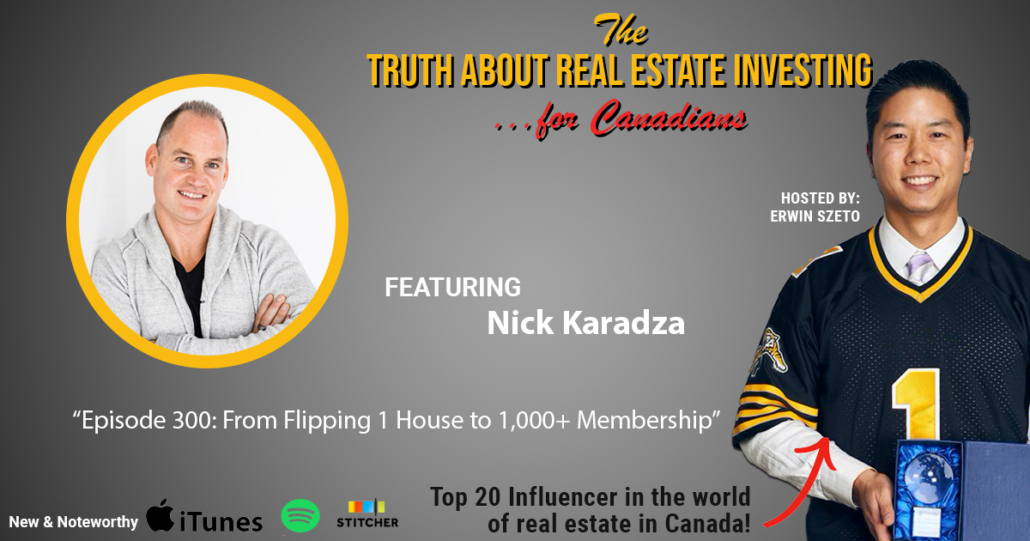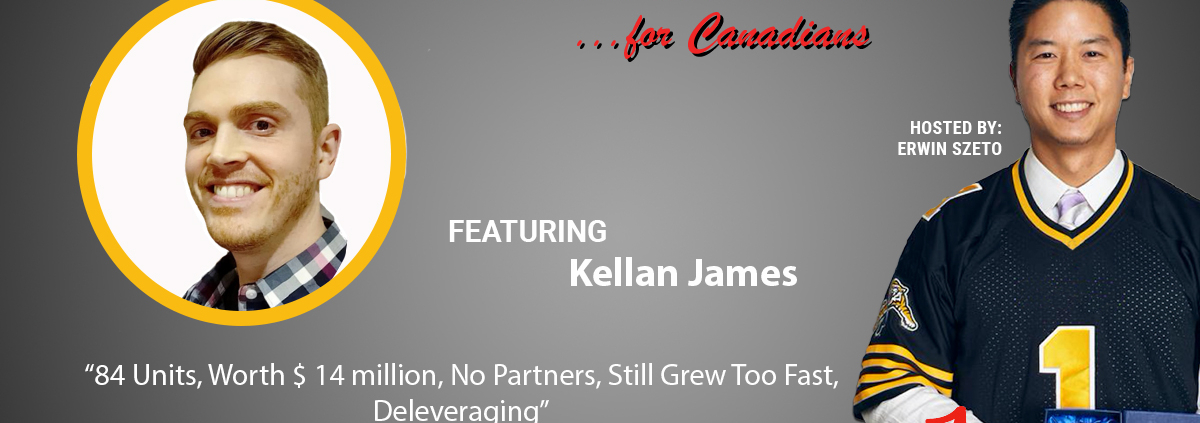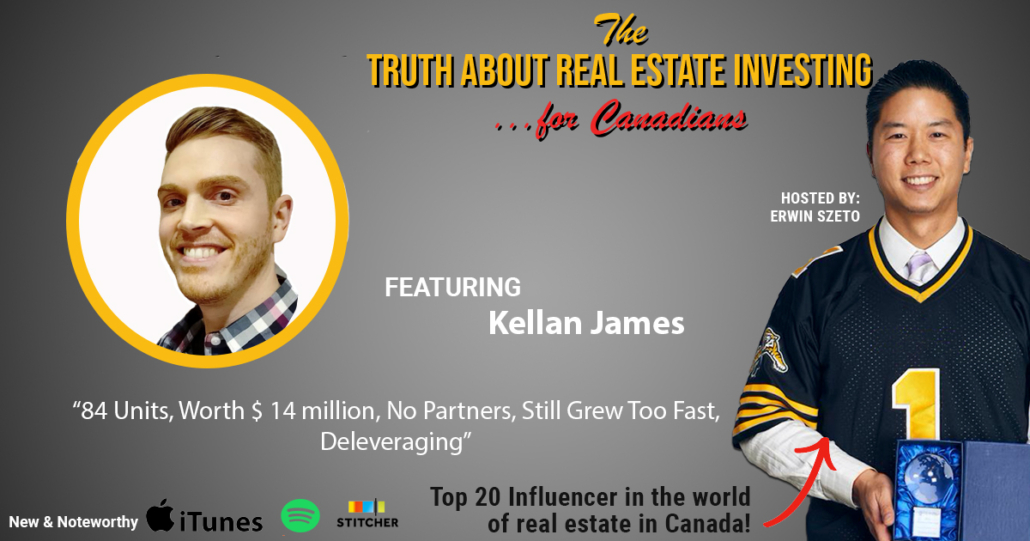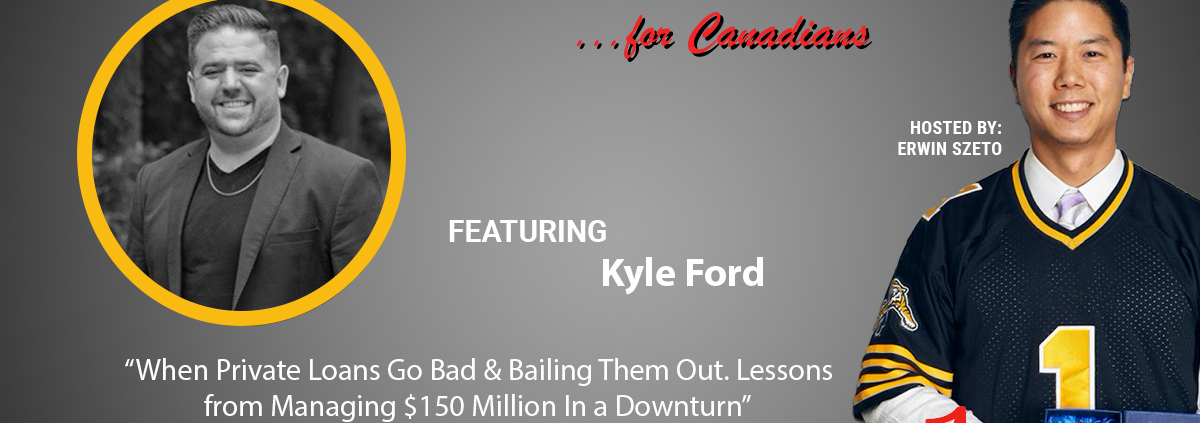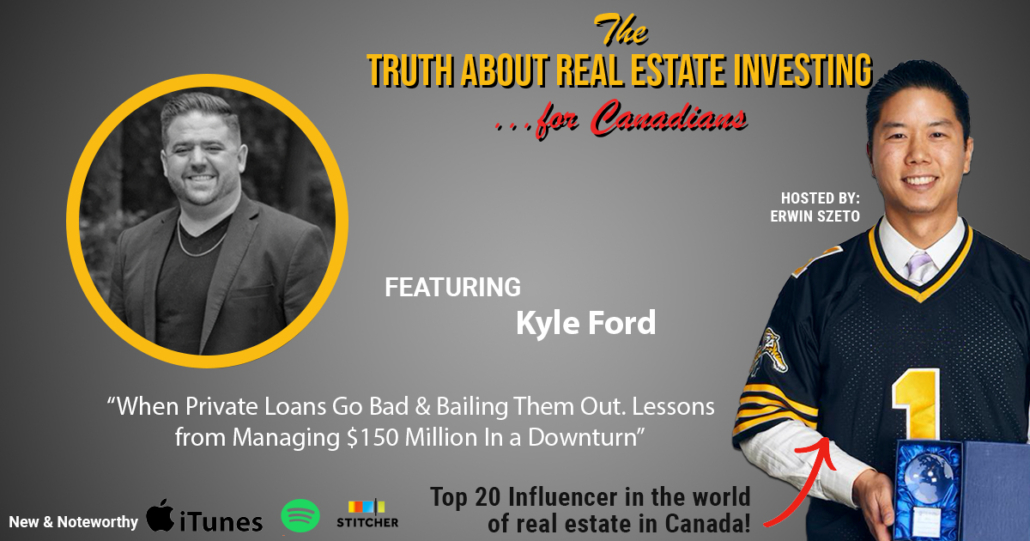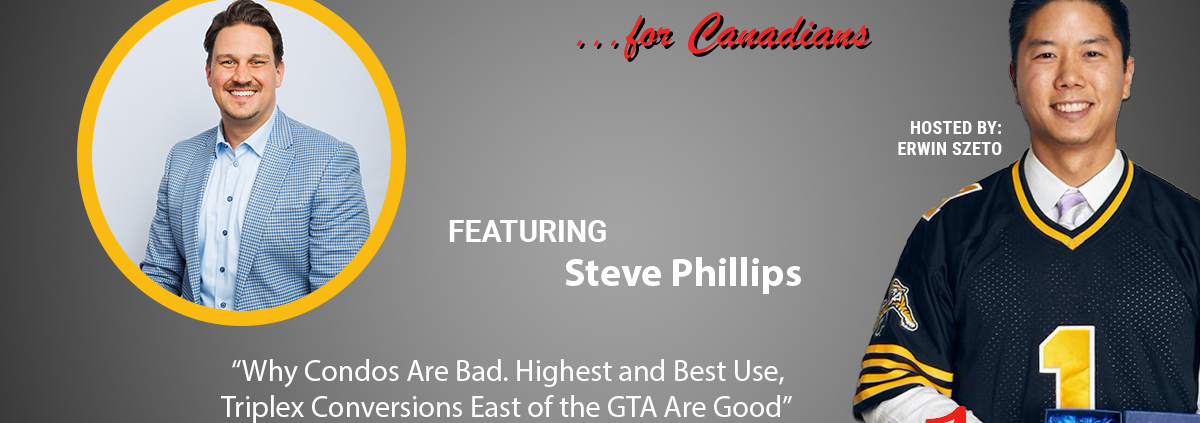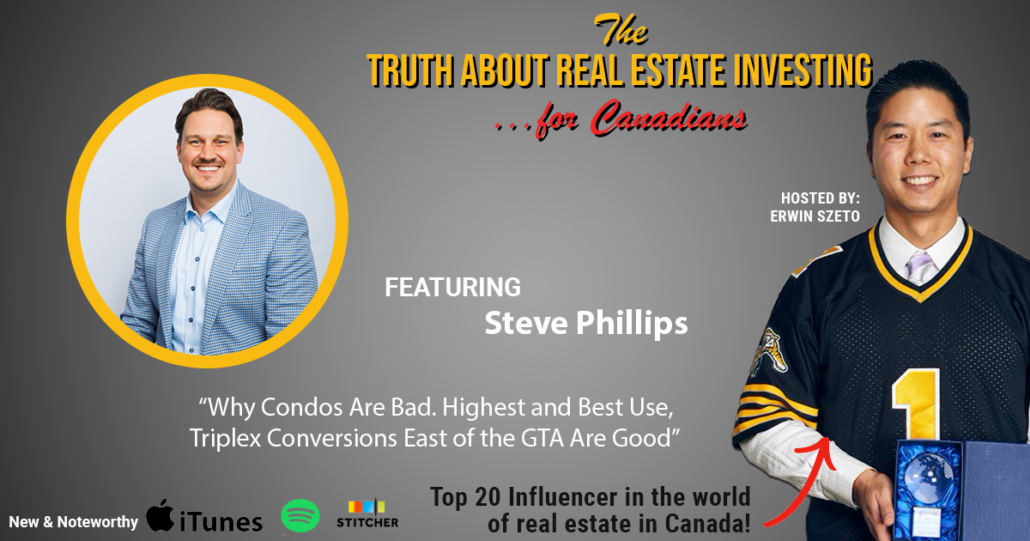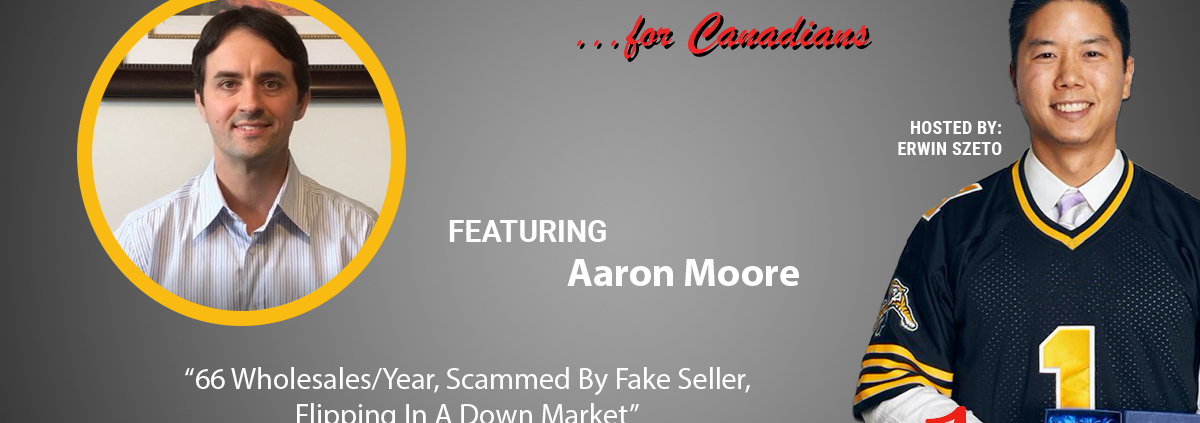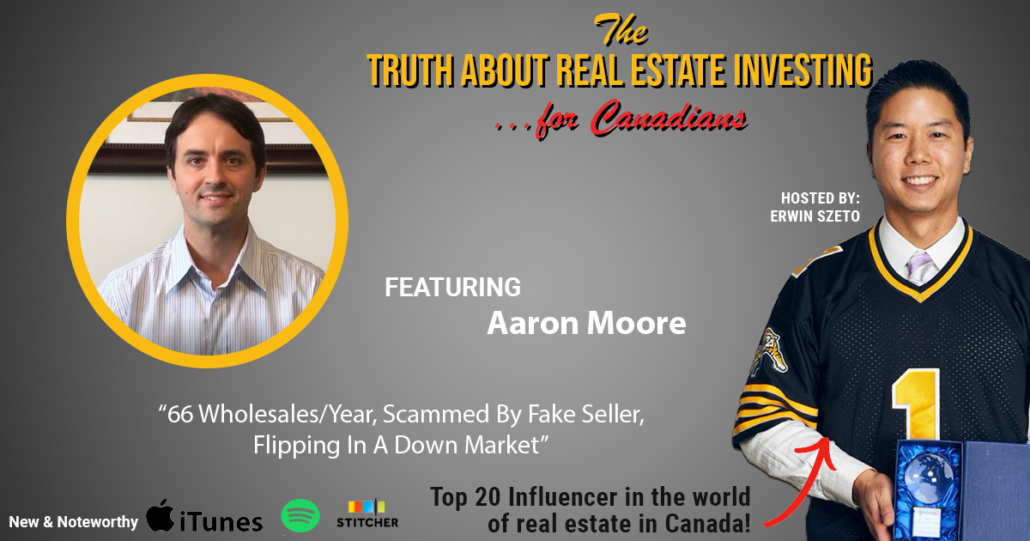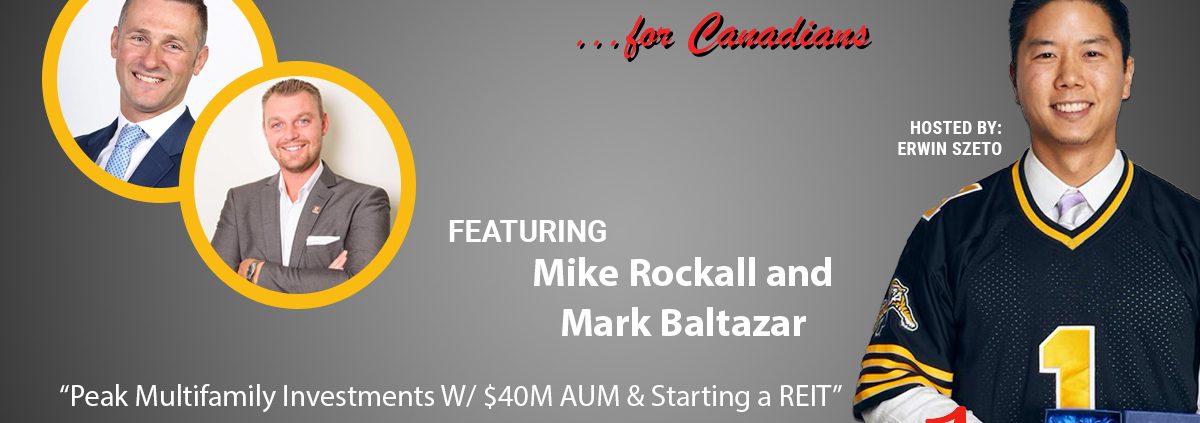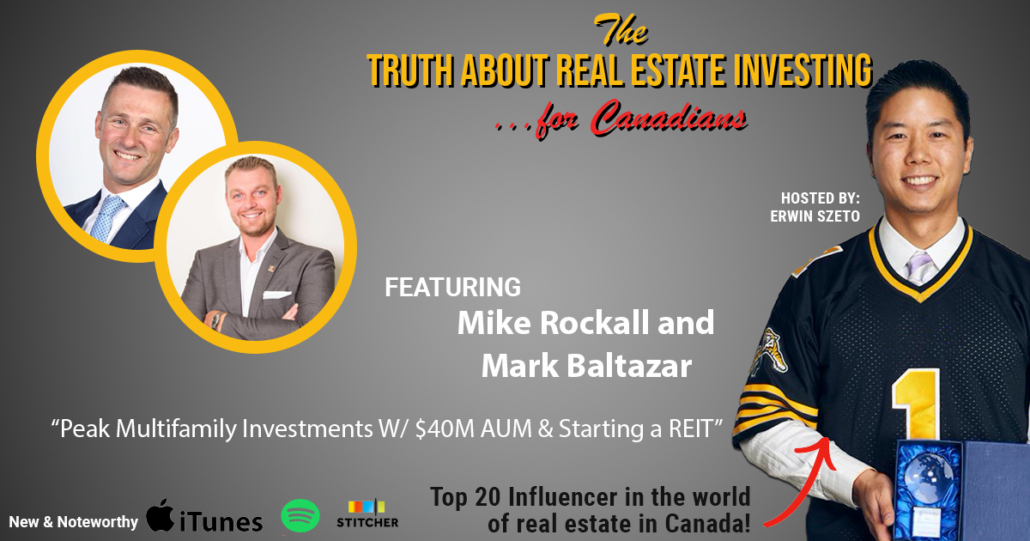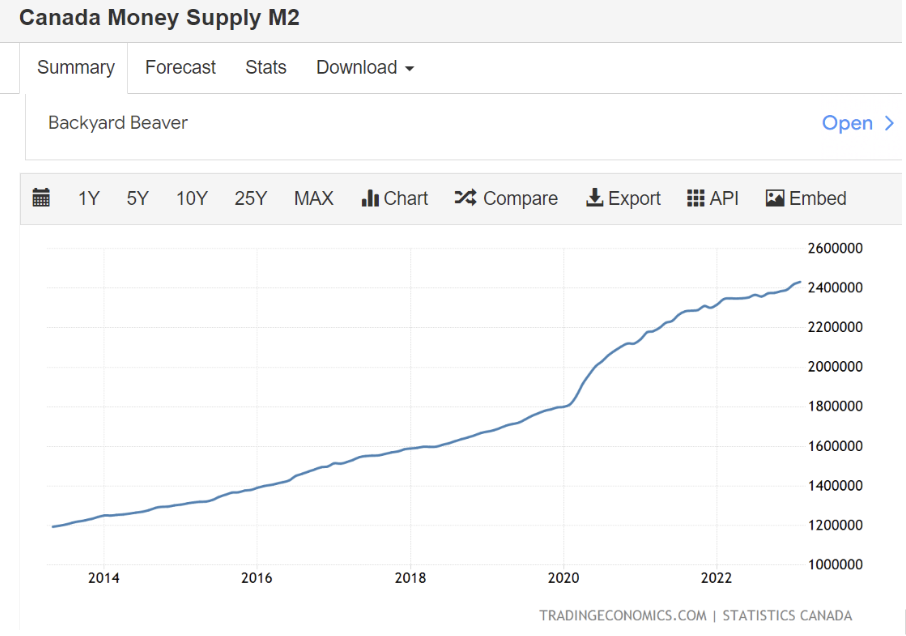50 Strategic Flips: Navigating Market Shifts with Luc Boiron
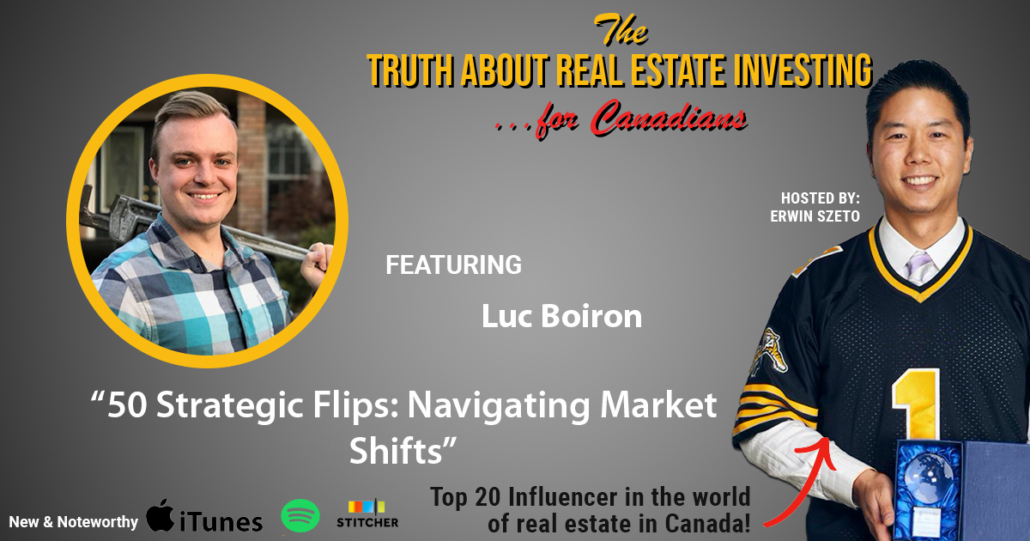
Welcome investors to the truth about real estate investing show for Canadians. My name is Erwin, I am Canadian, host and producer of this show since 2016, 300+ episodes, over $440 million in investment transactions, and four time Realtor of the Year to Ontario Real Estate Investors. Presently I have 45 millionaire and multi millionaire real estate investor clients and I’d like to get that number up to 200 within ten years.
I just returned from a trip to Calgary to meet up with some clients, real estate investor friends, Calvert Mortgages, and attend a friend’s wedding in Canmore.
Wow, Canmore and Banff are so beautiful. If I couldn’t live in BC or Ontario, like most Canadians, I’d probably live in Calgary as I like the vibe, the mountain views are always there. People are nice, world class skiing is only two hours away.
Admittedly, I’ve never been to Edmonton and you Edmonton bulls out there really need to speak to your Calgary friends as they don’t seem to have many nice things to say about the job of living in Edmonton LOL. Maybe it’s a hockey rivalry thing. I also just google mapped it: I had no idea Edmontonians have to drive through Calgary to get to Banff or Lake Louis.
Investment wise I’m not interested in either Calgary or Edmonton and forget Canmore where I’m told the average house is $1.4 million.
In speaking with Calgarian Ryan Day of Calvert Home Mortgages, when we compare numbers, I can get the same rent to price ratios on single family houses and not have the complication of multi family duplexes or triplexes etc… Ask any duplex investor, besides how expensive and long it can take to suite a basement, I heard a GTA Contractor today estimated 5-7 months, $130,000 assuming everything goes smoothly working on a 70 year old house.
In my experience, the tenants fight due to noise and smell transfer. I had this one tenant complain every time the basement tenant smoked weed in the backyard.
Anyways. I’m looking to simplify, earn US dollars and make my investing as passive as possible with as little risk as possible. I’m also making plans to fly out to Atlanta with Cherry to vacation post tax season, check out some properties, make our way to Memphis and along the way hit some serious, iconic attractions like Lookout Mountain, Coca Cola Museum and Graceland.
Tax Season ends April 30th and that’s when I get my wife back. We’ve sold one of our student rentals which closes May 6th hence we’ll be shopping for a new income property or two while on our trip.
I had/have three listings of income properties at the moment and will update you next week on what I’m seeing in the market.
50 Strategic Flips: Navigating Market Shifts with Luc Boiron
On to this week’s show, someone polar opposite to my strategy of lazy investing: fully involved and active investing including having executed on 150 or some deals in 2023 including 50 flips. While Luc Boiron lives in Ottawa, he has flips are far as Vancouver and while flips are sexy as people love to watch them on tv or take courses on flipping… well I’m sorry, not sorry we have Luc here to share a behind the scenes look at why he’s flipping and it’s not what you’d expect.
Luc is the founder of Bliss Realty, former lawyer, one of Canada’s leading investors. He has a massive team and even more massive advertising budget. Luc is a legit investor and even has some stories about fake it till you make it investors failed to close on buying wholesale deals from him.
Listeners, never forget, the community is a small one and we all talk. We know who the fake it till you make it investors and gurus are and where they learnt those strategies.
As Warren Buffet says “It takes 20 years to build a reputation and five minutes to ruin it. If you think about that, you’ll do things differently.”
Luc Boiron has also recently launched his podcast the Selfwealth Real Estate podcast available on Apple Podcasts and my fav platform Spotify.
Please enjoy the show.
To Listen:
** Transcript Auto-Generated**
(00:00) greetings everyone I just returned from a trip to Calgary to meet up with some clients real estate investor friends Cal mortgages and attend a friends wedding in Calgary and Canmore Alberta welcome to the truth about real estate investing show for Canadians my name is Irwin I am a Canadian host and producer of this show since 2016 300 plus episodes that’s and they’re all over an hour long over 440 million in investment real estate transactions uh as I my team and I are the four time real for the year two
(00:30) investors in Ontario Real Estate presently I have 45 millionaire clients U that’s millionaire and multi-millionaire real estate investor clients and I’d like to get that number up to 200 within 10 years I’d also like to have dozens and dozens of clients who cash flow over six figures a year uh again I just recently returned and canmore and B are so beautiful Lake Louise Shad out Lake Louise if I couldn’t live in BCR or Ontario like like most Canadians I’d probably end up in Calgary as I like the vibe the mountain views
(01:02) are they’re always there and they’re incredible people are nice world class G is only two hours away uh now apologies to my uh Edmonton bull friends and Edmonton edmontonians admittedly I’ve never been uh but uh you Edmonton bullish people need to really talk to your friends in Calgary as they don’t seem to have many nice things to say about about the about living in Edmonton maybe it’s a hockey rival rivalry thing uh apologies for their ignorance I just Google mapped it I had no idea that M
(01:34) antonians have to drive through Calgary to get to banned for Lake Louise or Canmore uh investment wise no I’m not interested in Calgary Edmonton uh the stuff is pricey holy cow and then forget camore where where I met with an old friend who is a city counselor in Canmore and he he informed me that the average house price in camar is $1.
(01:55) 4 million Canadian uh and also I was speaking to a Garian and Ryan day of Calbert home mortgages uh when we compare numbers uh he was sharing how he recently uh acquired a duplex with the gar detach garage and his combined rent uh the rent to price ratio uh is the same as I can get in the US on a single family home so I have less tenants and again I have the same rent to price ratio um and also for for those who already own multi Family Properties like including duplexes or triplexes ask any one of those investors if you don’t ask
(02:33) anyone of those in any one of those investors uh because aside from how expensive it can be to renovate a base a basement apartment uh I heard from a GTA contractor just yesterday who came into Rockstar real estate to uh to share about his Services the estimate uh including the permit time and the execution of the renovation you’re looking at 5 to 7 months so you’re 5 to 7 months with the V vacant uh assuming everything goes on time and uh the budget should be around $130,000 just for the renovation that doesn’t does not
(03:04) include carrying costs and again that’s assuming everything goes smoothly and we’re also talking about a house that’s probably at least 70 years old uh in my experience uh tenants so again I’ve done a lot of duplexes I have a good number of them in my own portfolio so in my experience tenants do fight uh that’s natural this this human behavior there’s noise transfer there’s smell transfer I had this one tenant complain about uh every time the basement tenant was smoking weed in the backyard now the
(03:35) tenant has a right to smoke in has a right to smoke weed he was actually smoking weed in the shed in the backyard yet my main floor tenant always complained about it anyways I’m looking to simplify I’m on a different Journey the most which is totally cool everyone has to go on their own Journey I’m looking to earn US dollars because US dollars are better than Canadian dollars if you don’t believe me just look at the amount of debt our country is taking on compared to the Americans Americans take
(03:58) on lots of debt too the Canadians are just especially good at it in terms I’m talking about government anyways I’m looking to make my investment more passive and as passive as possible with as little risk as possible I’m also making plans to fly out to Atlanta with cherry to Vacation post tax season we’re going to check out some properties we’re going to make it make this road trip we’re going to drive up to through Chattanooga through the lookout mountains we’re going to make a stop in
(04:22) Nashville of course uh and continue on our way to Memphis along the way we’re going to hit some serious iconic attractions like look up Mountain that I mentioned which is in Chattanooga which is on the border of Tennessee and Georgia we’re going to visit the Coca-Cola Museum and of course you know when you’re when in Rome the whole thing we’re going to visit graceand Jerry and I aren’t Elvis fans but again when in Rome you got to check out the the the home of Elvis Presley anyways tax season
(04:50) ends April 30th and that’s when I that’s when I joking jokingly say I get my wife back we sold uh we sold one of our student rentals which closes May 6 hence we’ll be shopping in May for a new income property or two while on our trip I had have I I’ve had or have three listings of income properties at the moment all the different stages and we’ll I’ll update you next week on what I’m seeing in the market on the ground and uh it’ll likely surprise you on to this week’s show someone who’s polar
(05:21) opposite to myself I like lazy investing we have uh a fully involved active investing investor uh including having executed on 150 or some deals in 2023 so 150 deals so that’s like almost that’s almost a deal every other day basically and that includes 50 flips that’s 5- Z and this is this is luk Luke boy wrong who is as far as everyone knows is legit he’s not one of these uh fake gurus out there Luke lives in Ottawa yet he has flips as far as way a far as away far away as Vancouver and while flips are sexy
(05:58) people love to watch them on TV or take coures on Flipping well I’m sorry I’m I’m sorry not sorry that we have Luke to share the behind the scenes on why he’s flipping and it’s not what you expect Luke is the founder of bliss realy former lawyer he also has his NBA smart dude obviously one of he’s one of Canada’s leading investors he has a massive team around 30 people and he has an even more massive advertising budget but don’t worry L going to tell you how he would start how he would start uh his
(06:29) business over if he was a brand new investor today so again he’s a legit investor and he even has some stories about fake it to make it investors who failed to close on buying wholesale deals from him so listeners never forget the community is a very small one we all talk we know who is who is fake it till you make it and we know which uh we know who the gurus are who are fake it till you make it and where they learn those strategies from so as the Warren Buffett says it takes 20 years to build a reputation and five minutes to ruin it
(07:00) if you think about that you’ll do things differently Luke also recently launched his podcast the selfwealth real estate podcast available on Apple podcast and my favorite platform Spotify again it’s called self wealth real estate podcast please enjoy the show Hi l what’s keeping you busy these days uh a lot of flipping houses a lot of Renovations going on that’s what’s keeping me busy that’s interesting because uh from what I know of you is uh you do a lot of wholesaling and now sounds like your mark business has done
(07:36) a pivot yes yeah uh basically our buyers a lot of our buyers stopped buying flips so we started buying them ourselves if they made sense to flip and started flipping them ourselves um you know we had about 35 employees in the business and if we were just relying on the wholesaling we would have had to drastically shink uh shrink our company and get rid of a bunch of people and we didn’t want to do that we have a really good team so we kept uh we kept our team and decided to Pivot switch into flipping and now we’re he we’re flipping
(08:06) heavily um we’re still wholesaling I think uh I think 2023 we did something a little over 150 deals in the year um sorry just wholesaling or flips combined so about 50 something flips I think I don’t have the exact numbers in front of me but I thought it was more 5050 but I guess I guess what really happens the wholesale deals are also much smaller deal smaller assignment fees um whereas the flips are well some of them take a lot more time uh bigger projects for sure fascinating and but like your staff
(08:42) though like wholesaling and flipping are really different businesses like did your fli your your St your in office staff now got strap on tool belts and start hanging drywall like what no no I mean and when I say 30-some plays that’s without contractors we actually have in our Ottawa brand we have two contractors and a construction manager and Ottawa is like our best flipping Market we flip a lot in Ottawa um and that’s partially because we have the team here and I also live in Ottawa now so I go see the job sites and
(09:14) things like that and the price point makes a lot of sense for flips so we flip a lot in Ottawa and uh yeah and then a couple other people who had different roles like one of our we call them closing concers like a transaction coordinator became a project manager for us so um the way the way I run the flips is I have my construction manager in Ottawa and then I have two project managers that are kind of like assistants to me and so they coordinate with all the contractors and and the details they know the finishes we want to use and any
(09:42) questions they have from contractors they they either Loop me into the call or they relay the questions to me to get answered and then uh so they’re kind of extensions of me to get these Renos done and and that’s how we we manage about 20 flips at a time yeah in different phases uh how many of those those are local versus across the country um I would say a a little less than half are in Ottawa probably about a third are local uh 30 40% and then a good amount in um in the greater Toronto area but that that range is a decent
(10:18) amount I mean we’ve done when I say Toronto for us it’s everywhere from you know Hamilton Niagara region Kitchener uh Stratford North Bay Midland aelia these are all flips we’ve done this year Peter bro Lindsay so those are uh Bowmanville those are all stuff we’ve done this year so it’s a pretty wide area that we cover that way um and then we have uh a few flips going on in Vancouver um and occasionally stuff out in Montreal as well those are I find it much harder to do the stuff in Vancouver in Montreal
(10:54) just um Vancouver in particular we just aren’t set up well for the flips and the distance makes it too hard for for us to check out easily we have you know a couple on the ground team for our acquisition like for a wholesaling business but it’s we’re not set up to flip well there so um I would say our Renos took way too long on the last couple projects there and the next ones we do we’re going to do much only focus on ones that are smaller Renos just the difficulty to manage Renos at a distance
(11:22) can sometimes be a little too hard so it’s more the distance than say like learning curve or like mature m maturing of the team there’s um an accountability aspect that if you’re not showing up regularly makes it harder in Ottawa and this might be Overkill but our construction manager basically drives from job to job all day so um you know he’ll he’ll visit every job site at least a couple times a week that we have ongoing in the auto area and that kind of keeps accountability going it also allows you
(11:54) to catch stuff ahead of time and um and this is it it’s a bit of a management error I would say on our side but there’s also an element where it’s kind of out of sight out of mind if you’re not I don’t know for some reason both myself and the project manager in charge of it it doesn’t we don’t prioritize it mentally as much the Vancouver job sites and so we’re not as on top of the contractor to make sure they’re showing up every day and everything’s happening the way it should
(12:22) so I would say other people could manage at a distance better than we did um especially because we do have some two people locally who can check in on the job site if we wanted them to um plus we have a really great realtor we work with in Vancouver um who obviously lists all of our properties and also we’ll check in on them whenever we ask her so um I think we could do a better job of it but we haven’t been so um kind of acknowledging we have some weaknesses and instead of trying to fix them where we’re not uh it’s more balancing how we
(12:56) operate to make sure they’re not going to be it’s not going to be it’s not going to affect us negatively in the future so thank you for raising that uh sharing your experience and and doing heavy construction like maybe that’s not return but active construction whatever it is because my advice to my clients is if you’re doing a major Rena even if it’s like a kitchen redo bathroom floor like that’s going to be a couple weeks and I’m sure it’s faster for you but like for example like a basement
(13:27) apartment that can be that can be months for example and so my advice my clients is someone needs to show up at least once a week and almost all my clients resist but your experience is the more often you show up the better absolutely at least once a week on an active because I’ve seen basement apartments take a year two years right it’s uh you get excuses from a contractor you’re waiting on you know I don’t know the architect hasn’t done the drawings they’re dragging things out you need to
(13:55) find a new architect you bring in this contractor they’re blaming delay on the plumber etc etc and just time disappears and time is money especially if you’re carrying something on like a private mortgage to get those Renos done really costs money so you have to be really on the ball with your Renos and I mean one of the nice things is if you’re showing up several times a week to the job site and the contractor is not there you f figure out pretty quick you need to fire them and move on to the next one right
(14:21) like they’re not there once like oh yeah well I gave you a heads up that we were going to be off this week for this reason okay perfect so you’re there all of next week great show up next week they’re there hey what’s going on Cu uh this isn’t working because they will not volunteer information that they’re not there yeah and it helps to put up cameras too um we’re not religious with doing this very well but we we use uh a combination of wise cams which are pretty cheap you can put in the memory
(14:45) card in them um so you can watch the playback without subscribing um with uh I mean on a longer Renault it’s actually worth paying for internet but we often use like SIM card internets with I think it’s called a rocket Hub or something like that so it’s a wireless mod we put a tablet SIM card in it and then um it’s enough data you know four to 10 gigs a month it’s enough data to uh to be able to put up a camera or two on the job site so it helps for you know protection of tools and break-ins and
(15:14) things like that but it also you know you’re pointing at the driveway you know when the contractor shows up right yeah yeah I have friends who would uh they they pay a neighbor to be able to put a camera on their property steal borrow their internet to put train the put the camera on their yeah absolutely and then um and then they they catch people stealing materials from their site for example y so yeah good good Pro good Pro tip for the listeners benefit uh now Luke before we’re recording um like you’re probably one of the biggest in
(15:47) wholesaling definitely wholesaling for sure in in Canada um and and before we’re recording I asked you how’s business can can you share how how’s business we’re recording in January by the way 2024 yeah um I mean it’s uh I think everyone’s hurting in the industry we we like I was saying earlier we have a big team we’re basically flipping to pay the bills and stay in the black we’re not we’re not trying to make uh make a bunch of money uh though I am optimistic we’re we should be making
(16:17) money in 2024 um but uh it’s nothing like obviously 2022 2021 it’s nothing like those years where the market was crazy hot um because we have the overhead we have plus uh buyers aren’t buying the wholesale deals so our margins get thinner we sell fewer of the deals and then we need to flip which takes a lot longer um to uh to get the money out of a deal right so to carry these properties now too yes absolutely and then you know obviously there’s a reason why we were wholesaling instead of flipping was you know you
(16:51) don’t have all the transaction costs uh on the front and back end of the deal so uh the flips have to make a lot of sense so you know your property tax bill must be enormous sorry your your like you mentioned Toronto Toronto has double double the land transfer tax yeah land transfer yeah every time um actually a little does Vancouver have anything like that yes they do oh God no but it’s not sorry it’s not I don’t think it’s double I’m trying to think I don’t think it’s double uh which is good actually I I
(17:23) interrupted you sorry no no no and well I was going to say one of the nice things Vancouver is they have a different structure for realtors and the way they price things um again you know typic whatever you expect is typical but they typically charge something like 7% on the first $100,000 sale price and then two and a half% thereafter total this is for both sides so it’s it kind of makes them you know hey we have to fill out the paperwork we have to create the listing we get you know more early on in at the for the just for creating
(17:56) the listing we get more on the first 100 000 so if you’re listing a $200,000 house versus you know whatever like it it doesn’t make as big of a difference in the sale price so when you’re listing Vancouver is an expensive Market when you’re listing a house for you know a million and a half um it actually costs a lot less of commission than it would in the GTA and I’ll just add to that though like people are free to negotiate I do believe that structure is legal in Ontario as well I’m not a lawyer I
(18:22) haven’t looked that I know you’re a lawyer but I I should probably look that up after this show if if because I’m pretty sure that that commission structure is legal in Ontario as well yes the question is how do you offer it to because the other in in Ontario depending on the city you’re in the buyer side agent’s expecting between two and two and a half percent whatever’s the norm in the market you try to undercut that they may not even show the property I know that’s the reality of
(18:48) the market yeah the reality is they may not even show it so I always pay the buyer agent whatever going rate is in that market and there are some markets where it’s 2% there somewh it’s two and a quar normal some two and a half so we pay whatever is normal in the market but um that means in Vancouver it means we’re paying about three and a half on the first 100,000 and about one and a quarter on the next on everything thereafter to the buyer side which is a just an interesting structure and I didn’t realize that you know uh going
(19:17) into that market in the first place which is nice and uh yeah I just add to that that comment it’s a with technology and I think we have like 70 or 90,000 registered agents on the Toronto real estate board alone like you would think prices would come down like commission like total the commission total commission number would come down so you would think but the result is instead the marketing spend for realtor goes up right Realtors just instead of bringing their commission down they spend more on marketing is what I
(19:52) usually see because they make so much when you do get a good client right or or get a full a listing with a full commission you do make um such a large amount that instead of cutting down what you’re going to make you just find more I find you typically Realtors find more clients but a good realtor is worth their weight in gold and from someone who does a lot of volume thank you for the kind words now I want to move on to um we’re like you mentioned how it’s tough times for many people and you and I were
(20:22) discussing before we started recording how uh there’s a lot of people who are talented and are having a tough time and uh just like yourself uh I don’t think you’re having as tough time as many a lot of people we know uh but I was saying how um like if you’re talented and you’re hardworking survive this period and you will Thrive over the long term what what what do you think about that oh absolutely and you know what the biggest difficulty for my company if we’re talking about that is just the size
(20:54) right I have 35 employees of overhead to pay we have you know High marketing budget Systems Technology we have big overhead to pay if it was just me then I would just do fewer deals but you know i’ make a little less money but you’re not worried about I I would say kind of um making sure you’re not losing money right overall or not losing a lot if you’re you can cherry pick right now you can be a lot more cautious as an individual investor but you can still do deals there’s still ways like there’s still opportunities I
(21:26) mean with Bill 23 with three units going in some cities allowing four or more um I find there’s still opportunities in this market to even get into the rental space right now um I just got final occupancy on a Triplex conversion in Ottawa um you know I built I finished a Coach House in 2023 as well in Ottawa so there’s definitely ways to I think uh to continue getting good properties now because you don’t have the same competition I mean we were almost almost exclusively wholesaling for a while there and then when the market shifted
(22:02) we started buying not only our own deals to flip we started flipping other wholesalers deals because we’re like hey if people aren’t buying our deals then they’re not buying anyone else’s deals either so there’s good deals out there let me go buy them to flip and we started doing that um and we bought off the MLS in this market a lot of stuff still sells well on the MLS but there’s still opportunities on the MLS to buy um more than there was before because the difference was I found it was very very hard let’s
(22:32) say at the beginning of 2022 to find a deal that made sense to flip on the MLS because there’s so much competition there was so much interest you were really really looking for an absolute needle in a hyack now properties are sitting a little more you have more opportunities to negotiate to find better deals um it still takes work but you know there’s always when I started flipping when I started my business my first couple deals I would say were listed poorly or incorrectly and I bought them off the MLS and that’s where I made uh that’s
(23:03) where I started off with flipping so I think there’s more opportunity to do that now than there has been in a long time so yeah I think there’s a lot of opportunity out there right now but it makes sense to be cautious as you do it and if you’re just an individual or you have one assistant or something like that you don’t have this big overhead to worry about so you can wait for the right opportunity you’re not rushing out there to uh you don’t have to be a Rive right now and I think that is also a strength which
(23:31) means you’ll have your reserves you’ll be in a good position as the market recovers which I really think it is going to be recovering well in 2024 right that actually going be my next question is you’re seeing opportunity now how do you think it’s going to play for the rest of the year I’m I’m seeing a I think there’s a lot of this comes down to buyer sentiment both on the investor side and the retail side um I used to sell all of my flips in multiple offers but with buyer sentiment changing buyers don’t
(23:59) want to compete and um and so it didn’t make sense to sell things in multiple offers and it hasn’t for you know a year and a half now um or more than a year and a half now but uh you’re starting to see a lot of people who think the spring market so we’re we’re recording this in beginning mid January of 2024 we’re we’re starting to see a lot of people thinking that the spring Market’s going to pick up and some people are thinking well if the Market’s going to pick up now is the
(24:29) time to buy so I just listed a property three days ago um in Ottawa in a very good area of Ottawa that I ended up spending this was a fire damaged house or smoke damaged there was a a fire that started in the basement smoke went everywhere so I did quite a bit of renovations to this house like extensive and it’s really beautiful um if anyone’s seen it on on my my Instagram it’s the one where like I took uh these vintage uh I I like the design stuff it excites me I took these vintage um National Geographic Magazines that I found in
(25:04) another flip and I cut out like all the interesting bright colorful pictures from them and I glued them onto the wall as an accent wall in a powder room um so that one that one’s uh oh wait you did it personally no uh I was there with my construction manager and his girlfriend we all went like select it yeah I Instagram uh Luke self wealth that’s right yes l Sor L I’m it’s right in front of me but I said spel it wrong Luke luk is Lu there’s no um I don’t know how else you spell Luke oh LK
(25:41) is the other popular yeah yeah it’s the French way of spelling Luke my family’s French so there you go um but so we did a beautiful Renault to it and it’s in a very desirable area of Ottawa with not much like there’s actually only one other listing in that neighborhood and it’s sold conditional so there’s nothing on the market I would like to to get into the eights and so I said well let’s be a little aggressive with this let’s see what happens and we listed for 500,000 three days ago and I’ve have 111
(26:11) showings booked so far in three days that’s wonderful yeah in this market right so who knows I’ve gotten a few was 111 showings show us that there’s buyers out there for the right product in the right area there’s buyers out there I have some rural listings right now I wouldn’t put those in mult and try to do multiple offers in a rural listing they they need the right exposure one’s on 10 acres one’s on Seven Acres they need the right exposure on the market it takes longer but the right product in
(26:46) the right area I’m seeing that there’s clearly demand for that product and as people are worried that prices are going to go up this spring you’re starting to see buyers coming into the market now let me snap this up before prices jump this spring so I’m optimistic things go are going to go well we’ll see how uh how inflation holds and how that affects interest rates but um people are optimistic that we’re going to see some interest rate Cuts this year and if that start happening I think the Market’s
(27:17) going to recover well enough I mean we’re not we’re not talking early 2022 kind of craziness but um I’m expecting to see some positive people craw coming back to the market slowly that because people have really been sitting on the sidelines especially investors as they see the opportunity okay interest rates are starting to fall if I buy a bur now I can get a good price on the product when I refinance I’m gonna rates are going to be lower so if they’re judging the market right that can be a
(27:45) good opportunity to get in sooner and uh and then um do better than you’d expect if you were buying when the Market’s already recovered you’re going to be paying a lot more MH yeah with the bond market coming down already we’re receiving cheaper fix rates right uh and the good friend of mine who is an agent downtown Toronto he told me it’s nuts for houses in downtown Toronto not condos because uh good I’m doing a flip in downtown Toronto right now so and you so you pay the double land transfer tax your buy be
(28:18) the double land transfer tax so he was telling me about a property it was listed way low 750 and it drew 25 offers and it ended up selling for almost 300,000 over uh so my money is on you getting at least a dozen offers um I’m hoping so I’m thinking and that’s the thing if I get a dozen offers I’m taking an offer um there’s no way that I get a dozen offers and I think oh I Can Do Better waiting there’s no way if I get two offers and I don’t like the best offer then I may you know cancel and
(28:52) realist at at around where I want to be but if I get you know 10 12 offers on offer day there’s no way that that’s not the best I’m going to do so I will be taking whatever the best is at that point now again as a professional investor would you get this many showings if your property was tenanted no as nice as it is my poor tenants I mean we’re talking this is backtack showings constantly they’re double booking uh time blocks and stuff like that so the poor tenants would be driven insane yeah
(29:28) yeah I I just want to throw in there that the it’s almost as if it if a property is tenanted it’s almost a stigma against the property yeah and then like I would say where a lot of my rentals are when I’m you know and I’m talking like bungalows in Ottawa or things like that or condo tow houses um I would expect them to sell for almost 50,000 less tenanted I would expect that because the unless it’s a very sorry unless it’s like made for investors as a product then at that point the fact that it’s
(29:57) it’s a rental is fine but if even as a duplex your best buyer and it may not be a full 50,000 discount on a duplex for tenanted but your best buyer may be someone who wants to live upstairs and rent at the basement right so having the upstairs vacant would be and and honestly getting good rent in the basement with the upstairs vacant is probably the best way to sell a duplex of um in my opinion but yeah if it’s just a single family rental some of mine are uh yeah you’re GNA do way worse with a tenant in there a friend of mine bought
(30:33) a a duplex in downtown Toronto and he asked me what should do what should you do with the basement he’s going to live in the main floor he’s going to house hack I said absolutely don’t rent it to a long-term tenant you’re living in it you were allowed to short ter rental so that way you you know you avoid the RTA the LTB right yeah and in some ways it’s almost better to not have bought a legal duplex in that way because then you’re renting just part of your house um from because you’re living upstairs if it’s
(31:01) uh an in-law suite yeah even if it has a separate entrance you you’re essentially renting part of your house and now it’s you know you’re not you’re not having issues with the Airbnb rules in Toronto yeah I would think yeah I don’t have any in Toronto I don’t either I just don’t have enough friends who’ve had nightmare stories with could you just imagine like you’re renting at the basement of your home say you live there and you rent at the basement of your home and the Tenant
(31:25) doesn’t pay you rent now that they Park their car in your driveway there’s no way you’re not seeing them right and they’re in your home and not paying rent so this is why to my friend I would not do long-term tenant in your house you know he doesn’t need the money you know just do short-term rental hire someone to manage it and I would think even if you do longterm in your house if you can I would try to get a property manager or someone else to manage it just pretend you’re a tenant as well because if
(31:52) they’re angry at let’s say the landlord you don’t want them taking it out on you while you live there right it’s a good Pro tip it’s a good Pro tip uh but you know with affordability the way things are like almost everyone is trying to avoid long-term tenants right because it it’s almost impossible to cash flow anything in Canada long-term rentals especially are the problem we’re hoarding houses and making it other people can’t afford to live in them okay I hope no one I hope
(32:19) no one clips that because you have a lot more property of most people quing Luke Luke just told us what everyone’s problem is we need to we need to vote these people one of my favorite things to do when we’re building or renovating is actually adding units because I feel like I’m adding to the housing stock I actually take personal pride in that when I build a coach house it’s a new rental when I do a duplex now two families can live in that home um my uh property in Welland it was a 12 unit purpose buil apartment building I
(32:48) converted it to 17 units so I added five new units to the building um that that kind of I don’t know it gives me a pride that I I’m creating more housing uh when we have such a shortage of it and if someone gives me [ __ ] about you know oh you’re taking housing away I’m like I’ve added housing to the housing stock what have you done I agree that’s why that’s why I really like the model versus like pure like buying apartment building and renov vict and stuff like that like you know
(33:17) versus when you’re creating when you’re creating housing units you are benefiting Society yes absolutely right Supply is what we are lacking we can’t control demand we can control Supply though so let’s let’s do the the right thing and there’s so much more the government could be doing to incentivize Supply instead so both provincial Federal and all so many municipalities they just put up so many roadblocks that make it so much harder than it needs to be um and they’re letting it all so much
(33:44) Im so many immigrants so we’re g to have such an issue with housing and uh I don’t know I think it’s going to get more and more combative between people you know blaming landlords when realistically I think um it doesn’t make sense people blame landlords because they’re like they’re taking hous out of the housing stock like no they’re not leaving the house empty somebody’s living there it’s in the housing stock even the Airbnb rules are in my opinion really dumb because if you take um first
(34:10) of all if I’m visiting another city and I have my a family with me and I have a dog it makes way more sense for me to stay in a house rather than a hotel but on top of that if you have enough airbnbs operating that they replace hotels instead of building new hotels they’re going to be building new condo buildings or apartment buildings or if they don’t need more because there’s airbnbs significantly replaced it you’re going to have see hotels converted into long-term housing so if you let the free
(34:34) market decide too many airbnbs hotels aren’t busy perfect now these hotels are being turned into apartments that might join up two rooms and you know and make it an apartment so you you’ve seen like around the world it exists where hotels motels eventually get converted into long-term residences M you would see the same thing except you know you see fairbnb come into Toronto they um they write all these articles they they get interviewed on all these articles about how airbnb’s ruining the housing stock
(35:05) guess what the founder of fairbnb is a municipal lobbyist who was paid by the hotel industry to write all these articles and interviewed they did a really good job at lobbying the government and changing public perception to make Airbnb the issue it’s yeah which is dumb because if you look at the source problem like just look at Zoning for downtown Tor for example you can you can you’ll get full full support to build a office building which you can’t which nobody wants you want to build a condo Tower
(35:37) everyone’s going to fight you true and then it’s going to be rent control I know I know it’s not rent control right now but when Doug for leads office which you will eventually do you does anyone think the 2018 rental exemption rental control exemption stays right if we get an NDP or liberal government which is likely because duck for can’t stay in office forever yeah but I and that’s that’s why I don’t actually think the the rent control the removing rent control actually helped that much uh in
(36:06) building new housing stock Because by the way that they removed it um like when Kathleen win removed rent control um and Doug for put it back he didn’t put it back like retroactively so it basically means oh okay so if I build something new takes me five years Doug Ford’s out of office by then no now I’m no longer getting exempt from rent control control and why did I you know build this like it didn’t help the idea that I was going to be able to um keep R along with Market kind of thing yeah because things change so
(36:37) if Doug for had retroactively said okay no no we’re going back anything built after was it 91 96 something like that uh that Kathleen went had got rid of there was a it was somewhere in the 90s um that if they went back to those rules then you like okay so I may temporarily lose the ability to increase rents but then as another conservative government comes back in eventually they’ll retroactively make the same rule so I might as well I can build I can build I know at some point you know it’s not
(37:04) like it’ll be 20 or straight where I can’t increase rents above you know the cap two and a half percent or whatever or lower all right Luke we can talk about the subject forever I’d love to over drinks but I think a what I what our lessener would really benefit from would be for example if you were to start everything over again uh so say you’re say you’re brand new uh what are what are your first steps as as a brand new wholesaler in this market wholesaler flipper um I think the big thing is uh
(37:35) not spending a ton on marketing cost so I’d probably be looking for um I mean assuming I’m starting with not a lot of money um and I’m just doing it on my own I’m looking for uh I’m looking for deals on the MLS right and now those are hard to wholesale but if you find a good deal you can flip it so I’m going to networking events and I’m finding a partner who’s willing to fund a good flip someone who knows what they’re doing and they say okay you’re right these numbers look good let’s do this
(38:04) deal um so they’ll fund it so they can get a share of that profit and then um yeah I’d be looking on the MLS um the the like I said my first two flips when I started doing this whole full-time in 2016 um and I already I I bought my first rental in 2007 so I already knew how real estate worked so I was fortunate in that way but my first two flips that I bought in 16 um when I went into a fulltime one was listed low but on um outside of Toronto board and it it was right before the Thanksgiving long weekend so it didn’t
(38:40) hit treb until the Tuesday but I saw it on the public realtor.ca because it had showed up I think it was a Fergus board or something somewhere near GF so that’s why it showed up on realtor it’s a nice place but it didn’t but the property was in Bron so it didn’t show up on treb yet because it hadn’t they’ listed it on the Friday but they hadn’t managed to cross list before the weekend so it didn’t show up on all of the alerts for all of the local Realtors and yet the price was
(39:06) right so I went in I managed to see it on the Sunday we got a deal signed on the Monday before it hit the market to everyone else on Tuesday and it was a really good price um I think it was a semi I ended up making 80 grand on that um in a good market and then another one was listed uh impac had his four bedroom but they and three three to four bedrooms can depending on the area they may or may not be worth more as a three bed or a four bed in this case in Brampton in that area it was in more bedrooms tends to be better so they’ taken down a wall
(39:39) they listed it as a three-bedroom because they wanted a bigger Master listed it as a three-bedroom impac still had it as a four-bedroom so I did some renos to this but the biggest thing I did was I put the wall back up so now I’m selling a four-bedroom in an area where four bedrooms self for more and uh I actually bought that one I think there was five offers on it I bought it in competition and then I flipped it and I made like 75 grand um and the wall doesn’t cost that much money to put up no no very little
(40:05) wall way worse we refinished it we put new uh I think courts counters in like I still I think it was ended up being a 40 Grand Renault and with the way prices are right now on Renovations it’ probably be a 60 or 70 grand Rena these days but um it wasn’t like a crazy Rena I didn’t have to redo everything the upstairs bathroom was already good I kept the cabinets there was a lot I could keep MH uh so yeah it turned out quite nice made a good profit and that was buying it in competition on the MLS because I saw
(40:32) something the other buyers didn’t see that four bedrooms in the area sold for a good amount more than a three-bedroom and uh yeah I was able to find a buyer that way that’s want go deeper into that hack you did with the with the MLS uh for the listeners benefit uh for example I if I’m listing a property in Hamilton I list it both on Toronto board and Hamilton board now there’s lots of RA lazy agents if they’re an out Town agent they’ll list it on the Toronto board only and then that way the Hamilton
(41:00) board agents do get do not get notified so then if you’re if you’re trying to buy that property you’re not competing now with the local market which is significantly generally significantly bigger than the outside of Hamilton Market yes so so that is that’s a for us that’s been a regular opportunity because again now you’re dealing with notown agent who doesn’t know the market well they probably don’t even want to make the drive they just want to gone they don’t know the market
(41:26) Market they don’t want to come out right so they just want usually generally they want it they they just want to get the deal done and you know what this agent was going to list it on toron board it just didn’t get cross-listed in time but I guess what I’d say about that is if you’re looking for opportunities you’ll find it a kind of stupid quote that I I like is uh you can’t get hit by the money truck if you’re not standing in the street so if you put yourself in a position where you’re regularly looking
(41:52) for opportunities you’ll find them but you have to be putting yourself in a position to look for those opportunities now as a source for for deals you we were we were talking about like you’ve had not so great experiences with uh V inv investors who are not that experienced yet yet their social media profile tells tells you that they’re done 50 deals in the last two years or something can you without naming names because you know we innocent till proven guilty we’re not interested in getting sued by anyone uh
(42:26) I’ll the term you I don’t think you mind the term you used was fake it to you make it and and I’ll I’ll elaborate on that just for the listeners benefit because we’ve seen that through history like for example Elon Musk even though my I’m a fan of Tesla I own a Tesla Drive Tesla the very first Tesla that was on the stage that they used to pitch and raise money for Tesla did not drive right they had you they had to push that car on the stage it did not it did not go anywhere right yet he
(42:55) he was able to raise millions of dollars so so fake toam make it has been big through history um and unfortunately you’ve had to deal with these people and real business transactions yeah so you know one example one thing that I look at is um and you see this from dealing with investors it’s having a a good eye for this some investors are really good at doing real estate and either aren’t good at or don’t put much work into raising money some investors are really good at raising money they’re not particularly
(43:27) good operators of real estate and if I had a choice I would invest with someone who’s a good operator of real estate every time over someone who’s good at raising money I can’t agree more um and you may even get you know they may even be offering better returns let alone you know the result will be better but they may be offering better terms because they’re not focused on raising money so they’re not as um they don’t have as many people offering them money which means you know a lot of
(43:54) people don’t like some people don’t like raising money I don’t particularly like raising money I’d rather not have to do it when I do it um because I’d rather just focus on real estate I love real EST yeah let’s just drill it down down a little bit so I’m the same way I don’t want I don’t want another person wanting to hold me accountable to something I don’t want to be answerable to someone else that’s why I became an entrepreneur right so I don’t want to be answerable to an
(44:17) employer so that’s that’s personally why cherry and I do not have Partners in our investment property so sorry continue yeah and I also find like I don’t like the idea of losing someone else’s money so I’m basically let’s say if it’s an equity deal um I’m going to protect your downside but then also sharing the upside and it’s like well why am I doing that yeah same yeah I I’m like I’m doing all this work you’re not doing any work I value work over capit and credit right like you know like help
(44:46) like that’s that’s that’s my personality as well I prefer people to help then I prefer like gifts or anything like that yeah sorry continue and and yeah and just a quick my first few flips I did with someone else’s money and I would partner with someone and they would get half of the profit for putting in the capital for down payment and Renovations and carrying costs so they’d put in all the money I would do all the work find the deal manage the renovation sell it Etc and then they would get half the
(45:11) profit so um that actually can be very very good return for someone but for you know they were taking a chance on me as well so they made really good returns uh and I didn’t need the capital so it’s a way for people to get in but obviously you don’t want to be losing someone else’s money but yeah back to the fake tell you make it so I’ve seen some of these people who are kind of more about raising money than they are about operating and one example is someone who’s kind of wellknown as an investor
(45:38) has a lot of Partners or raises a lot of money um they called us up for one of our wholesale deals this maybe a couple years ago now um and they had um a JV partner that they brought in that was going to buy the deal on paper or actually buy the deal right because that’s the way the JB partnership works so they’re going to be the owner they’re going to finance it they’re going to put up the money exactly yeah so this investor asked us oh can we push the closing back uh you know a couple weeks
(46:08) and you know we spoke to the seller and the seller said no we can’t we’re buying something else we come to the week of closing the JV partner can’t reach the investor hasn’t heard anything from them they’re very frustrating this JB frustrated this JB partner passive partner can’t reach their part their investment expert partner exactly supposed to be putting in all the work and so we get to like the day before closing finally hear back from the investor and they’re like no we need
(46:34) that extension we asked about we’re like okay now we have no choice obviously you know we go back to the seller with eggot our face basically saying we can’t this isn’t going to close we can’t close you know tomorrow we have to push back puts them in a bad position makes us look bad we managed the deal does end up closing but uh there was a lot of frustration on everyone’s part just lack of responsiveness probably taking on too much at once for this investor doing too many things at once MH um but that
(47:02) that’s a really bad business model to not communicate with everyone going on and um yeah so it it was it was not a great experience another one we’ve had is uh a group kind of a training group that some heard of sorry A Tribe if you will yep um there was a lot of more I would say instead of focusing on the fundamentals of real estate how to invest they focused on mindset which mindset can be really important if mindset is your issue but you can’t also get out from the fundamentals so we ended up being I can’t mind myself mind
(47:41) set myself to be Elon and then build an electric car um I have my shortcomings in the engineering space sorry uh so it it becomes more uh difficult we we ended up to the point where we almost wouldn’t work with people who were associated with this because this happens to us several times they would essentially lie to us we’d be like okay so you have your financing in order um you know you’re pre pre-qualified or you have a private lender you have the cash available like oh yes we have it I have lots of cash no problem we won’t have
(48:18) any issues paying your assignment fee and closing on time etc etc this happened with several at least three that I can think of people associated with this group that um they buy the deal from us promise all these things give us a deposit and then we see them on social media trying to raise money for the deal and then they can’t illegal well and they’re firm on the deal at that point oh my God the risk yeah they’re firm on the deal and then they can’t raise money they all like this is all like you
(48:49) know like burn the bridge burn the ship we’re going to make this work strategy yeah and I mean we hate that because we’re you know we’re a lot of our sellers are in positions where they need this to close like we’re trying to help them out and if one of our buyers can’t close our contract typically has relieved of liability but that doesn’t matter in the same way as like this is screwing over the seller yeah if you can’t because these are human beings right yeah um so you know we’ve had to
(49:19) negotiate some extensions and I think in all three of those cases I we had to find another buyer kind a last minute and we are able to so you know we might be double the work for you now well and we might be walking away from an assignment fee just to get the deal to close um L income too you’re working for free now yes yeah um and so it’s we typically don’t ask you know our buyers to prove uh that they have the money but that’s something you know sometimes we may have to uh if they can’t show that they’ve had experience
(49:50) and know what they’re doing because buying from a wholesaler for your first deal ever I don’t High I don’t recommend it highly unless you you really you know have done your research and you know what you’re doing because construction background like that those things will help you absolutely there there’s just more complexity to it in terms not complexity but you’re typically not able to finance the assignment fee except with some mix like uh one I work with closely is Calvert out in Alberta and
(50:15) they’ll Finance the assignment fees as well as long as the deal makes sense and they they run the numbers on the deal as well um to make sure they agree that it makes sense um but a lot of a lot of banks won’t lend on the assignment fee we’ve seen it happen a few times um but typically they won’t lend so what I mean by that is if you buy a house for uh we buy the house for 500 you’re buying from us for 520,000 the bank will look at okay we’re going to lend you 80% of 500 not 80% of 520 so you have to pay the
(50:42) 20% of 500 which is 100 Grand plus the 20K in cash so you need 120 instead of uh 80% of 520 would be uh 416 so you need 104 instead of 120 right so you’re you’re you’re funding more out of pocket and cash um so that’s one thing and then it just um yeah a little bit you’re buying a property that needs work or the seller’s in distress so you need to be willing and able to accommodate a little more M and then there’s usually have a pretty decent Siz project scope size ahead of you in order
(51:18) to execute and get your money out often but we we also have TurnKey situations because we we look for a combination of seller distress and property distress one or the other or both the typically the best deals are going to be ones where there’s both but sometimes you have situations where it’s kind of seller distress but the property is not in particularly bad shape um so it’s more sometimes it’s the ease for the seller sometimes it’s speed that they’re looking for um and you know sometimes the property is in good shape
(51:46) for example but they’re um going to go into power of sale and they need to sell really quickly because the sheriff’s coming kind of thing and they want to sell quickly so that might a situation where the property may not be in bad shape you know it’s always going to need at least some paint and things like that but it’s not in bad shape um but they need speed uh to make it happen and yeah so and that’s the importance of being able to close on time yes yes so I’ll just add that there’s U like your
(52:15) experience with with that one group that was focused on buying with no money down and all sorts of things like there’s several groups out there and I’ve heard the same story from many vendors not and other groups as well how they will turn down that business they i’ I’ve heard from even like mortgage brokerage groups who refuse business from certain groups the training groups like please don’t send us anyone don’t tell them you know us that’s us red flag when you see enough people of it it becomes a pattern where
(52:46) they must have been told to lie it’s not just that that’s almost the difference between fake it till you make it and like lie about it I think think that’s push I don’t know um I think it’s pushing it past just like trying to give the perception that you know what you’re doing versus fullon lying oh yeah no I have the money lined up I have it all you know we’re all good and then they don’t you know that’s a bit of a different situation to be and I feel like that particular group was teaching
(53:11) people to lie which is not a group I’d want to be part of and now the consequence is there’s all these people declaring bankruptcy and uh and they’ve got and they owe money to people they owe money to friends and family like it’s I’ve never seen it this bad before and I was I was in the community investor Community back in 2008 when we had the financial crisis when we had a real it wasn’t that bad right yeah this this period now is way worse than anything I’ve seen in my career in terms
(53:40) of like Financial like U disaster yeah I just had one property of Ruby house back in 2007 2008 so it wasn’t you know if anything I don’t know I feel like it almost helped me because uh I was I had an RBC mortgage on it and my payment was it was a variable mortgage but my payment stayed the same so I think I was four years into the mortgage of a 25 year uh amortization and I think I had 11 years left on it after four years on a 25 year right because I was paying down so much more in principle because the interest fell
(54:13) by so much um but yeah I mean so if anything it kind of helped me out at the time but it’s different now and I mean some of the people some there’s a balance between taking enough risk and not and taking too much risk and I think I understand people taking a lot of risk early on when they’re just getting started they don’t have much yet your first when when they’re single no kids yes and your first and they have job they have job income coming in to to you know to balance out the risk yes
(54:43) well and I understand why some people do like uh they might do an in-law suite instead of a legal duplex right on your first deal but once you reach a certain scale you know like you or I I don’t want an illegal unit in my portfolio it’s too risky for me if something happens what if insurance doesn’t cover it Etc so you’re you’re you can take a little bit more risks in your first deals but as you build more you have more to protect and that yeah that becomes scarier so I don’t want illegal
(55:09) units I don’t want things that I know aren’t up to code I’m not willing to take that kind of risk at my portfolio anymore um yeah yeah I saw a talk by uh these uh Reit owners very famous story out of guf two brothers and their friend I think everyone knows what I’m talking about if you know if you’re in the if you’re in the industry you know what I’m talking about but I remember them saying uh you can only live in so many houses so we had to uh scale up into commercial properties because they were doing they
(55:36) had like they had over like 50 student rentals in guol right so they’re making lots of money but again like you you can’t you can you can’t live in 50 properties yeah very hard to mortgage and everything right yeah oh can I just show I just want to show you this quick chart and I’ll talk about to The Listener benefit so this is the overnight so this is a benefit for anyone who’s watching on YouTube like this is the over Bank of Canada overnight lending rate you and I were just talking about uh back in like
(56:03) 07 yeah the rates were almost just as high right I don’t know if you remember but I was doing like 25% down and 5% mortgages back in 2007 right so like and then we’re pretty much at the same level interest overnight uh interest rate wise but people were not screaming and crying about like going people weren’t going bankrupt in the community back then and my comment is about like how hyper overleveraged our community is and and Canadians are in general when when we have seen rates at this level before
(56:37) yeah and I feel I feel bad for the people who I think were doing it relatively right but there’s there’s times in my journey as well where if I was caught at the wrong time it could have caused me bankruptcy as well luckily I’m established enough I’ve been through enough and I’ve built my portfolio enough that I have a lot more reserves and protection and I’ve been doing it longer but if I had kind of decided to scale up and bought my first you know unit that needed a lot of renovations right at the wrong time and
(57:04) that was like you know my second or third deal or a few deals in and I’m I’m making this one big jump into the next property and at the wrong time as everything went wrong with you know rates and construction expenses and you know that could have there could have been times when it would have put me in a bad position and I feel bad for people who are like that then there’s others that I feel less bad about because it’s you know you had um you had a long time to build this but instead you didn’t
(57:31) structure your business in a way that was you made the assumption that the market would always be going up and that’s a really bad way to run a business if you take that risk for one deal that makes sense you have a portfolio and you take you know you have a portfolio of 10 properties and one is a risk that can be okay because you have everything else as a protection everything else is stable and protected but if you buy 10 deals and they’re all kind of dependent on the market you’re putting yourself in a really bad
(57:56) position um and you know where you can’t do your other deals without getting the right refinance on your other ones and they’re all variable and you know and you’re not going to qualify if they’re at too high of a rate you’re putting yourself in a position where you’re risking your portfolio continually all the time that’s bad decision making yeah I saw a young gentleman buy two properties first for first two deals ever bought them at the same time in Trenton Ontario two duplex conversions and his plan was to use his
(58:28) personal line of credit for the renovation money to do two basement conversions I hope you had a lot of room personal line how big can a personal line be well if you’re pretty rich you you have bring personal lines but I’ve seen doctors with big personal lines but otherwise this was no doctor yeah H that’s risk I mean I don’t know about you I see a lot of duplex conversions coming in at like 200 Grand yeah if like the I’m seeing ret retail retail for just the basement alone usually around 160 and then you
(58:58) know the main floor often needs work so yeah you can get so the total budget will get over 200 yeah and it depends what you have to do right do you also have to do the driveway are you you know are you digging a lot of uh window wells right to the footing you know that kind of thing it a really big property then yeah the basement’s going to be more yes exactly fantastic all right Luke thank you so much for being generous with your time you we’re way over any final thoughts you want to share like first of
(59:24) all um like do you have a book coming out you have a speaking engagement like what are you up to uh well uh I am going to be interviewing you on my podcast shortly so we have the selfwealth real estate podcast which you can find on all the podcast platforms um follow me on social media as well Luke self wealth I’ve been posting a lot more content about real estate flips I’ve going on my rentals Etc um and yeah that’s about it just uh follow me on socials follow listen to the podcast and uh my my last advice is
(59:54) like like if you’re not in the market now start looking and make sure you know how to recognize an opportunity because I think there’s opportunities coming this year thanks so much Luke and I’ll for listeners benefit I’ll have all the links in the show notes and then like Luke like like we like we were touched on earlier like the people who got burnt in this period like if they stay with it won’t they be fine learn from the mistakes first of all learn for your mistakes yes yeah exactly like if you’re if you were able
(1:00:24) to through this this was one of the worst times for a lot of investors nowadays and I mean this wasn’t like the 08 recession in the US we weren’t hit nothing this was bad but it was bad because like you said there was a lot of Leverage that got expensive and that affected a lot of people um but things are going to get better and uh I’m not saying it’s going to explode like it was but things are going to be getting better so if you able to get through what is kind of the worst time and keep restructuring your stuff working on what
(1:00:49) you’re doing there’s going to be a you’re going to be rewarded going forward and even if that just comes down to holding your long-term rentals longterm too many immigrants coming in not enough housing being built I don’t see any way real estate doesn’t get more expensive and that you don’t do well holding your your portfolio that’s a great place to end it thank you so much Luke thanks everyone thank you for watching if you want to learn how to invest in real estate from scratch my team teaches
(1:01:13) beginners how to use the number one investment strategy that I personally use in a virtual free training class every month go to investor training.com destion as well I publish at least two to three videos a week here so subscribe if you want to keep learning from seasoned investors like myself my guests and if you’re just starting out feel free to ask questions and comment below and I do the best to answer each of those comments and questions myself again if you’re ready to learn the nitty-gritty about real
(1:01:41) estate investing from a professional investor register for our next virtual class that’s at investor training.com
HELP US OUT!
UPCOMING EVENTS
BEFORE YOU GO…
Before you go, if you’re interested in what kind of properties I am looking at in the landlord friendly states of the USA please go to www.iwin.sharesfr.com for what I consider the best investment for most Canadians, most of the time.
I’ve been investing in Ontario since 2005 and while it’s been a great, great run. I started out buying properties in the 100,000s and now it’s $800,000 to $1,000,000. How much higher can it go? I don’t know
To me, the remaining potential for appreciation does not match the risk hence I’m advising my clients to look to where one can find rental properties that are affordable range of $150,000 to $350,000 US$, with rents that range from $1,400 to 2,600/month plus utilities. As many Canadians recognize, these numbers will be positive cash flow and are night and day compared to anything locally. Plus the landlord has all of the rights, no rent control, and income is US dollars which are better than Canadian dollars.
If you don’t believe me, US dollars are better than Canadian dollars, go ask 100 non-Canadians which currency they prefer to be paid in.
So to regain control of your retirement planning. Go to www.iwin.sharesfr.com and check out what great cash flow properties are available in the USA.
The best part is, my US investments will be much more passive compared to by local investments as I’m hiring an asset manager called SHARE to hand hold me through the entire process. As their client and shareholder, Share will source me quality income properties, help me with legal structure and taxes, they manage the property manager and insurance provider while passing down to me preferred rates so I save both time and money.
Share will even tell me when to strategically refinance or sell. SHARE can even support investors all over the country for proper diversification hence my plan is to own in Tennessee, Georgia, and Texas. Share is like my joint venture partner but I only have to pay them fees while I keep 100% ownership and control.
If your goal in investing is to increase cash flow, I don’t know of a better strategy for most Canadians most of the time. One last time that’s www.iwin.sharesfr.com to see what boring, cash flowing real estate investing can look like on your path towards financial peace.
This is how I’m going to make real estate investing great again for my family and hope you choose the same. Till next time!
Sponsored by:
This episode is brought to you by me! We don’t have sponsors for this show. I only share with you services owned by my wife Cherry and me. Real estate investing is a staple in my life and allowed me to build wealth and, more importantly, achieve financial peace about the future, knowing our retirement is taken care of and my kids will be able to afford a home when they grow up. If you, too, are interested in my systematic strategy to implement the #1 investment strategy, the same one pretty much all my guests are doing themselves, then go visit www.infinitywealth.ca/events and register for our next event.
Till next time, just do it because I believe in you.
Erwin
W: erwinszeto.com
FB: https://www.facebook.com/erwin.szeto
IG: https://www.instagram.com/erwinszeto/
